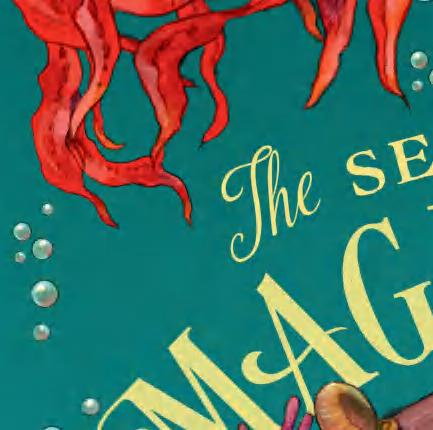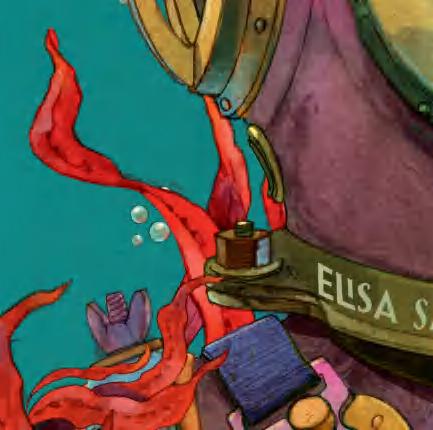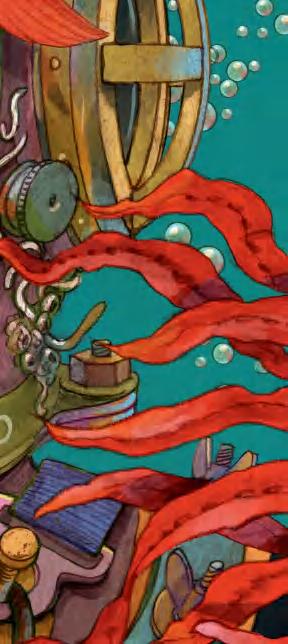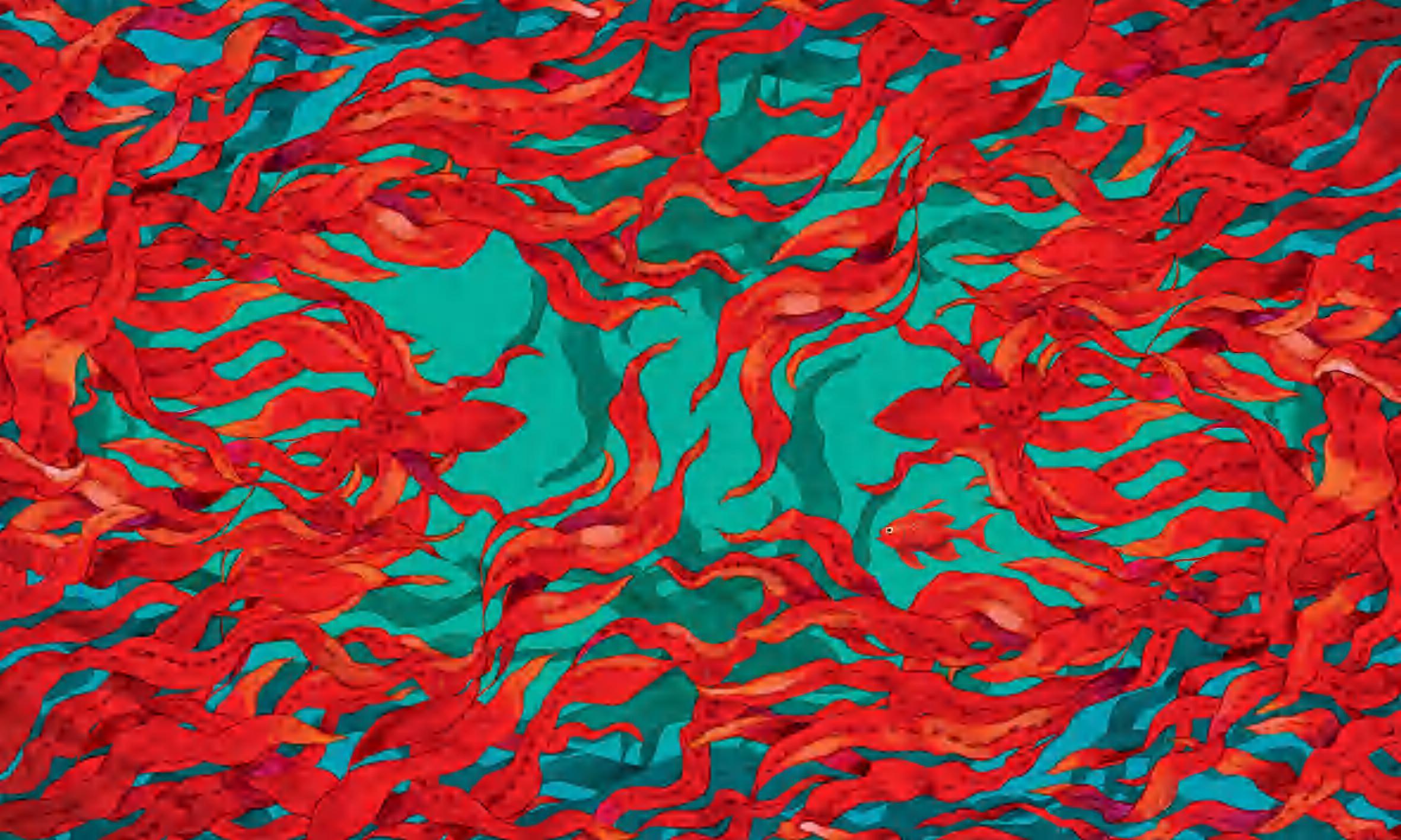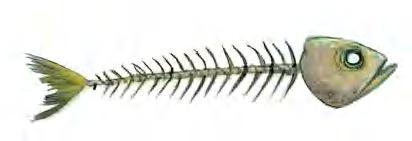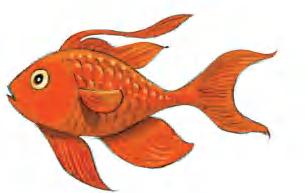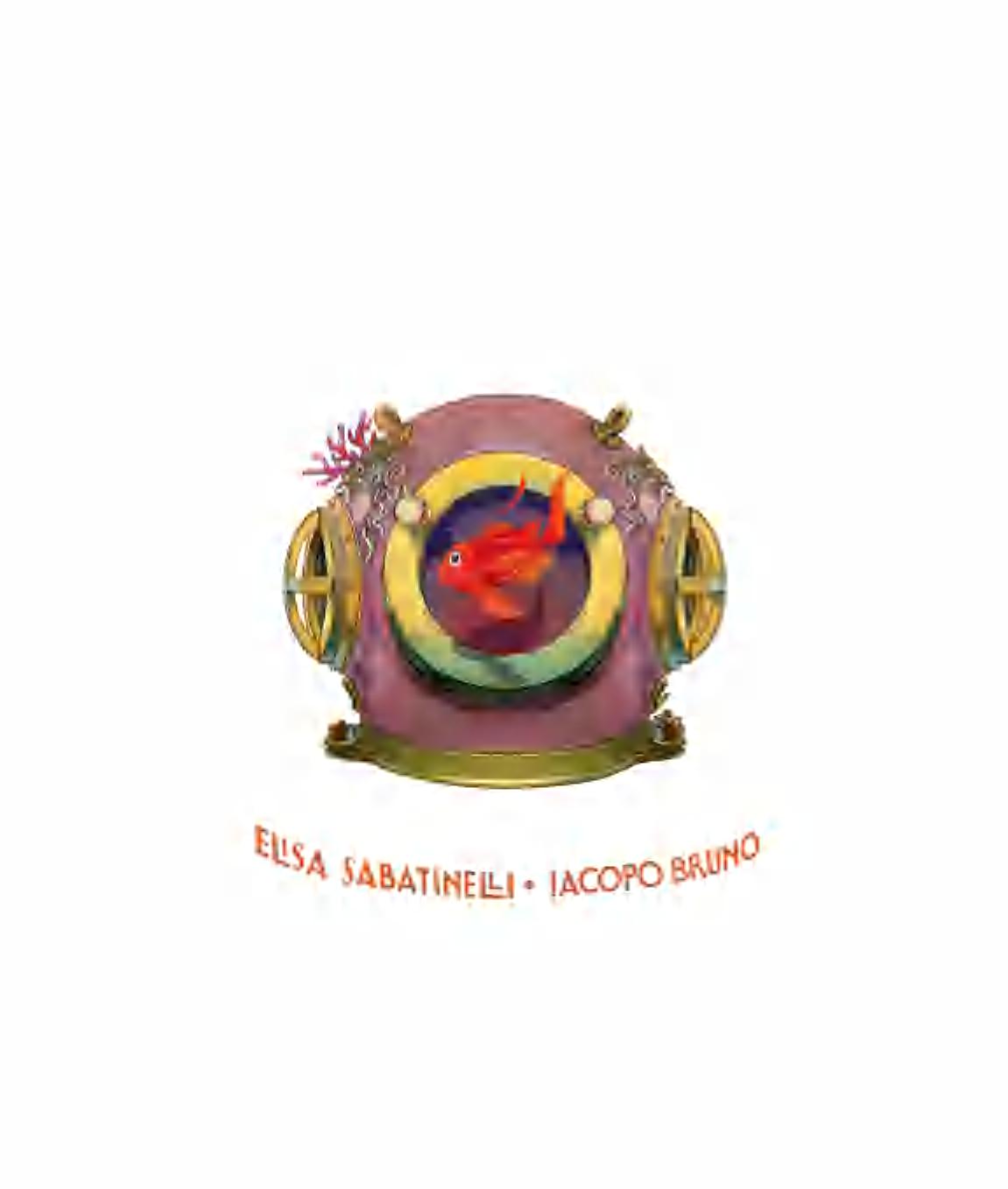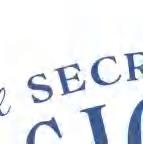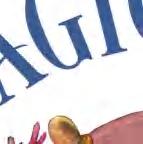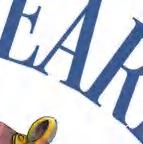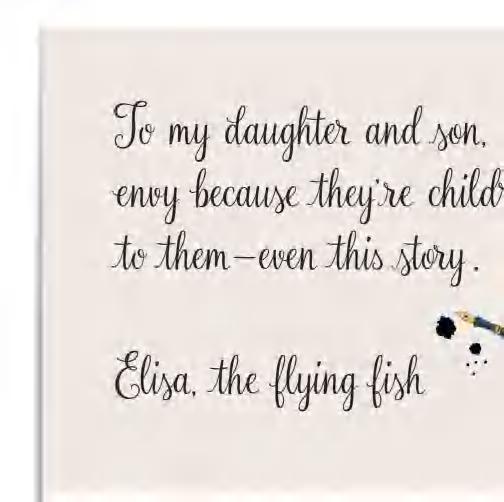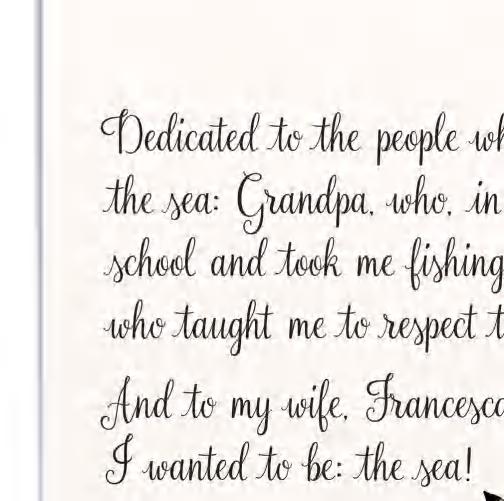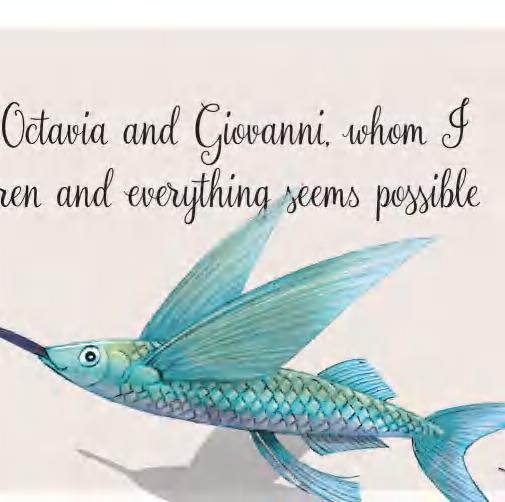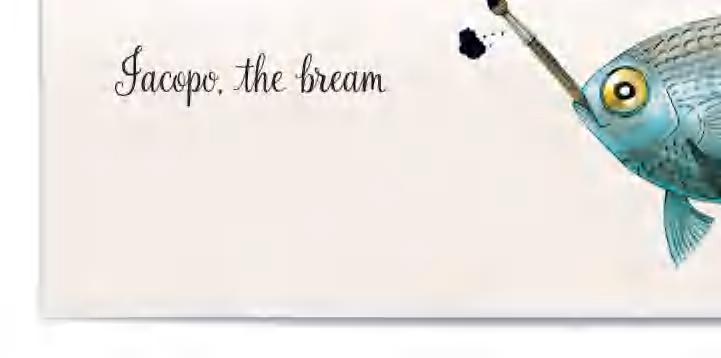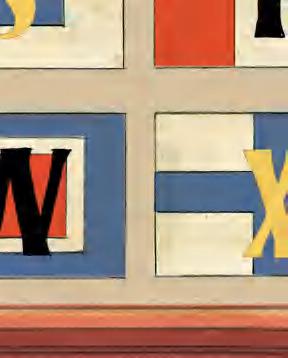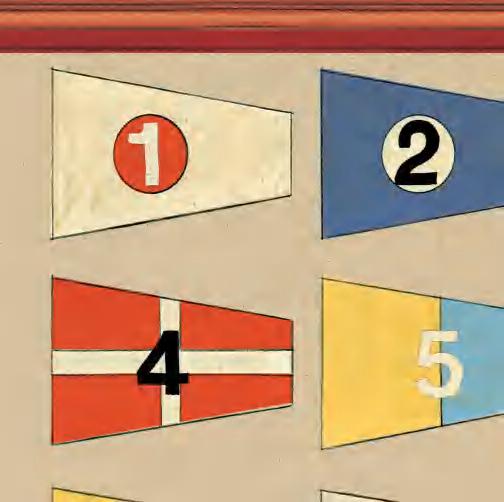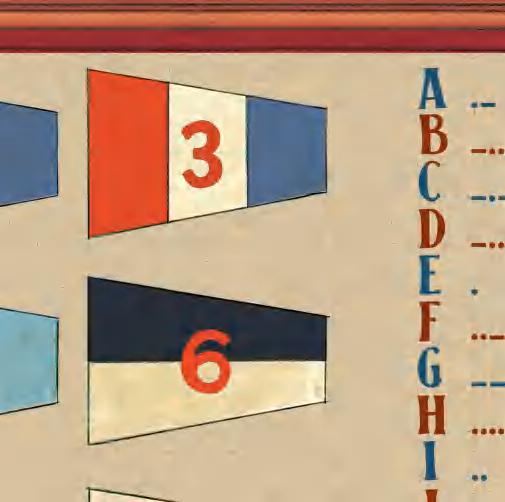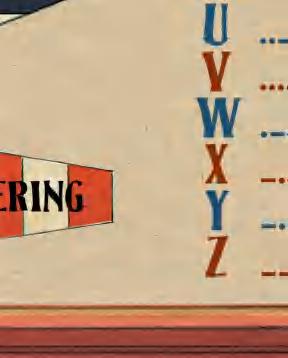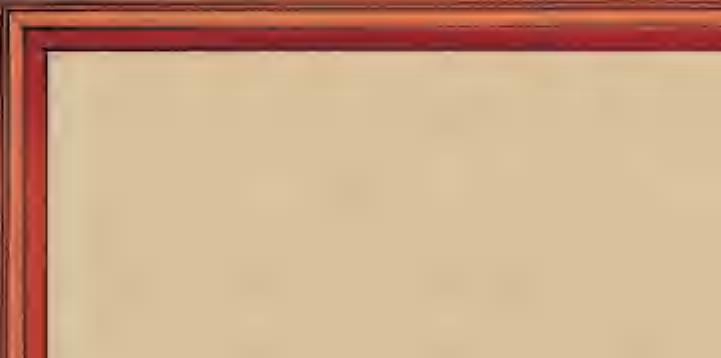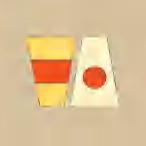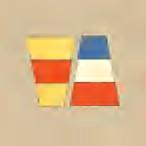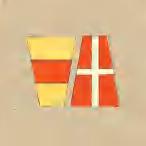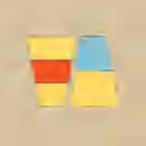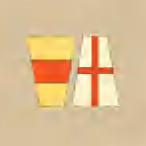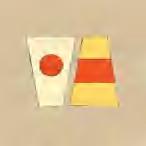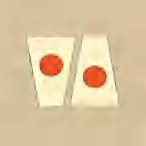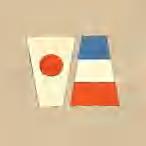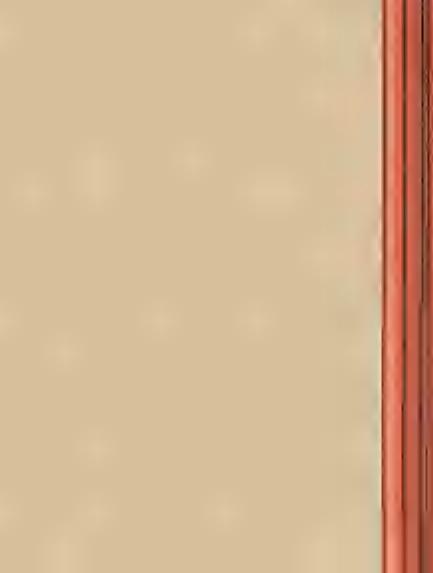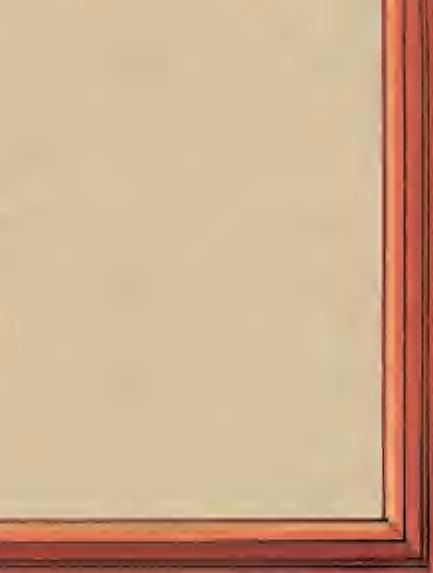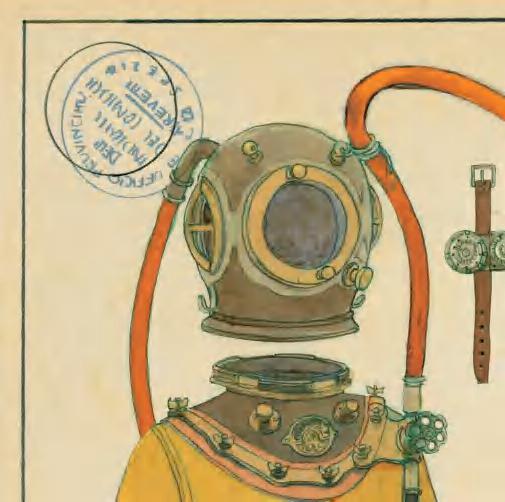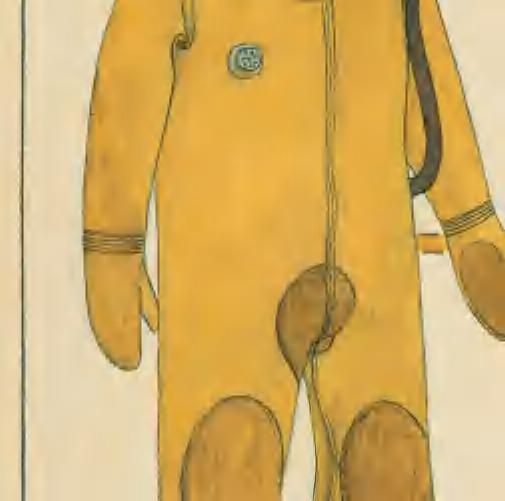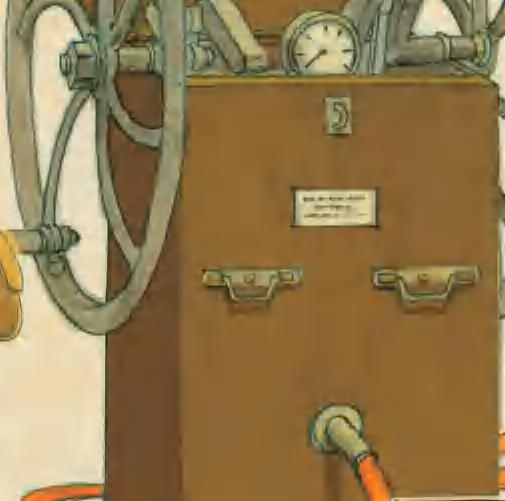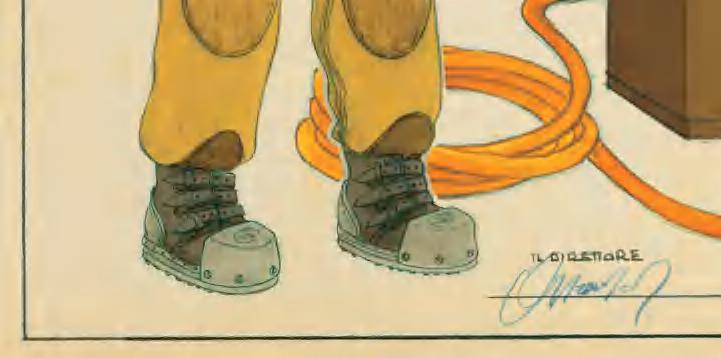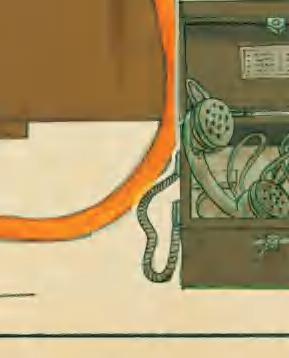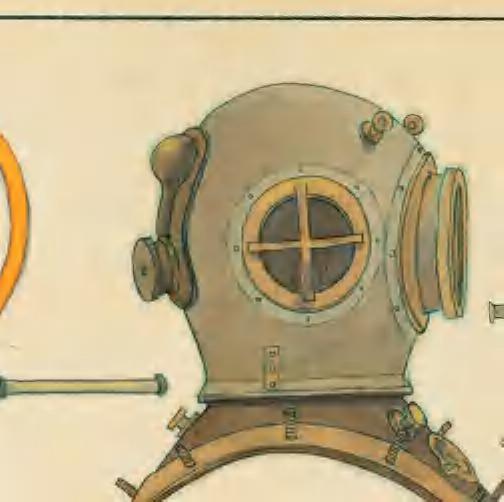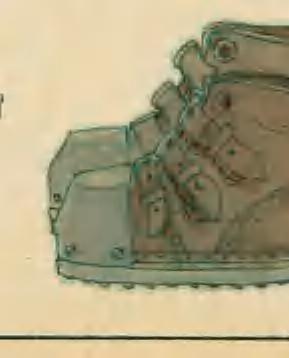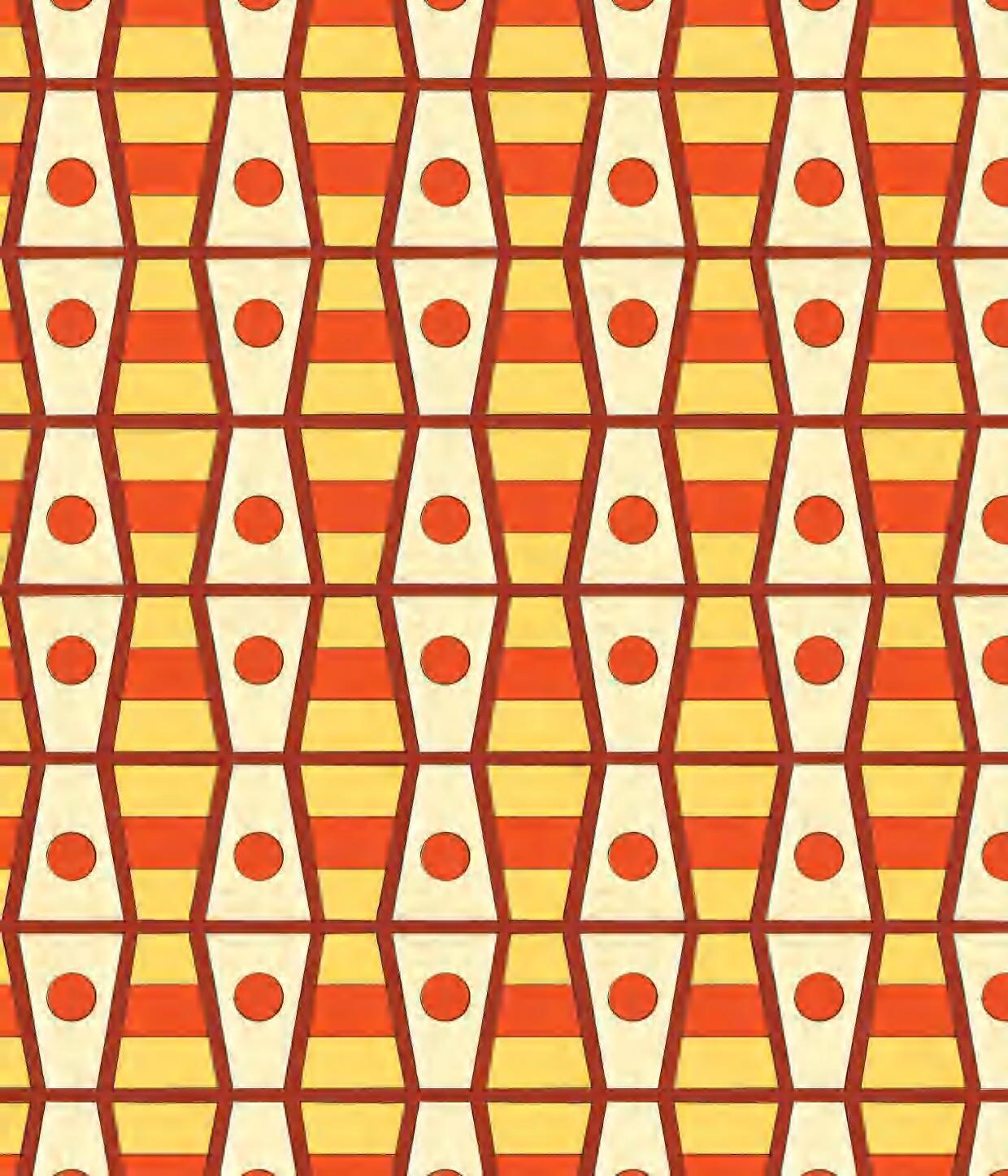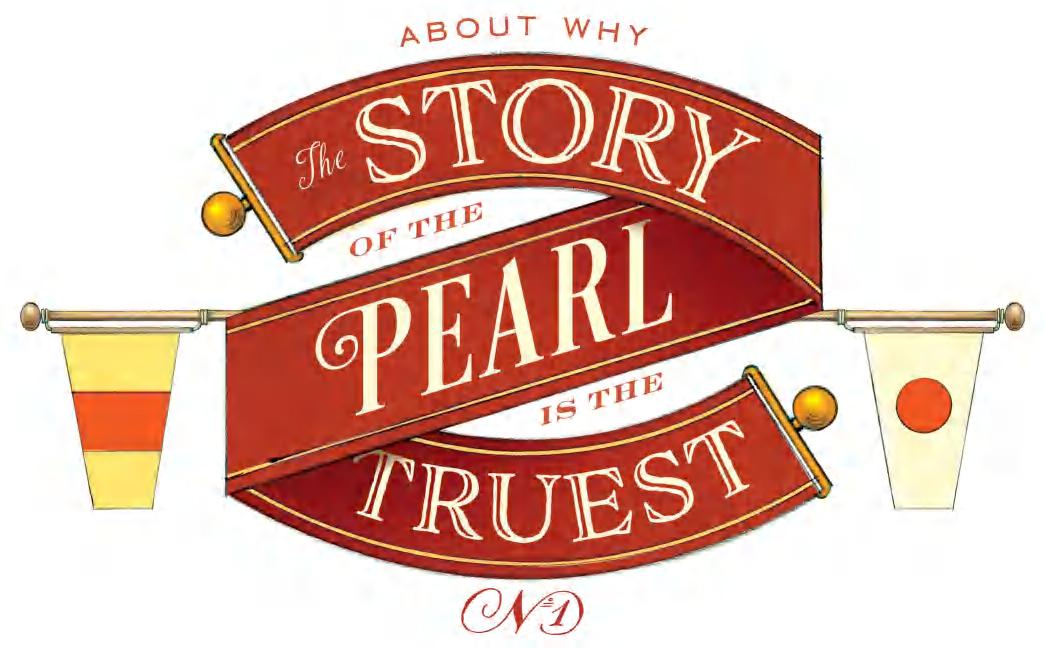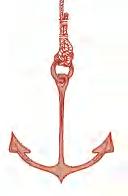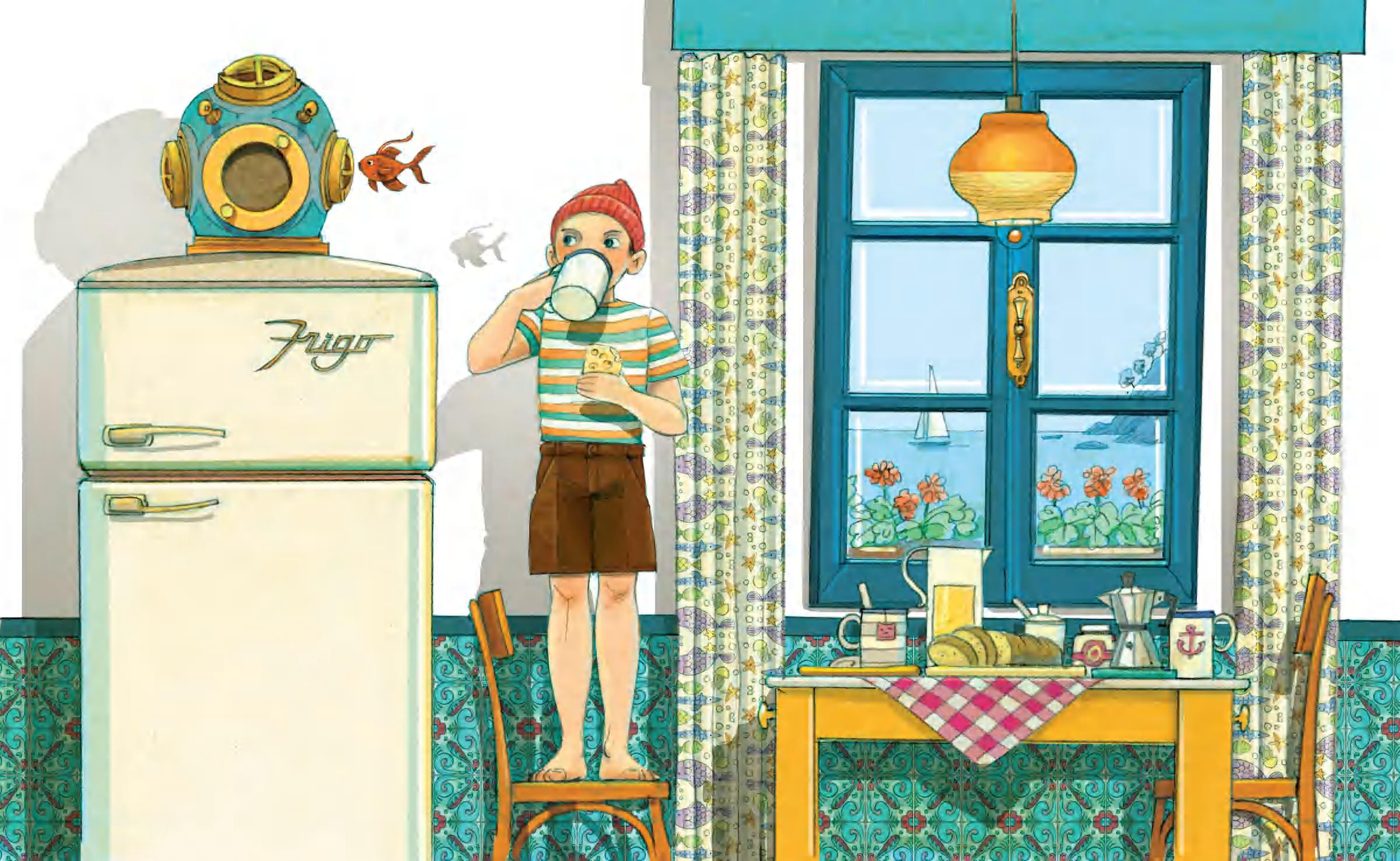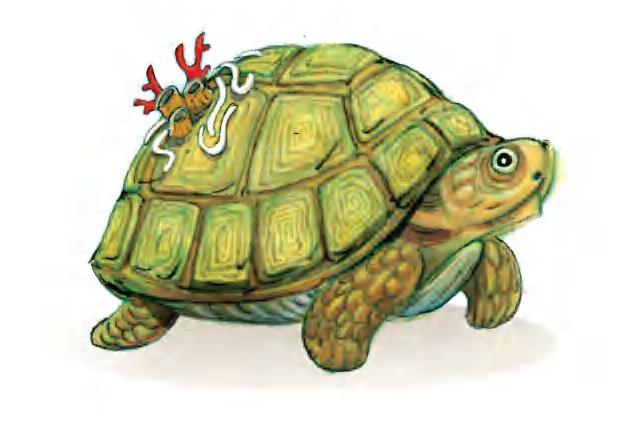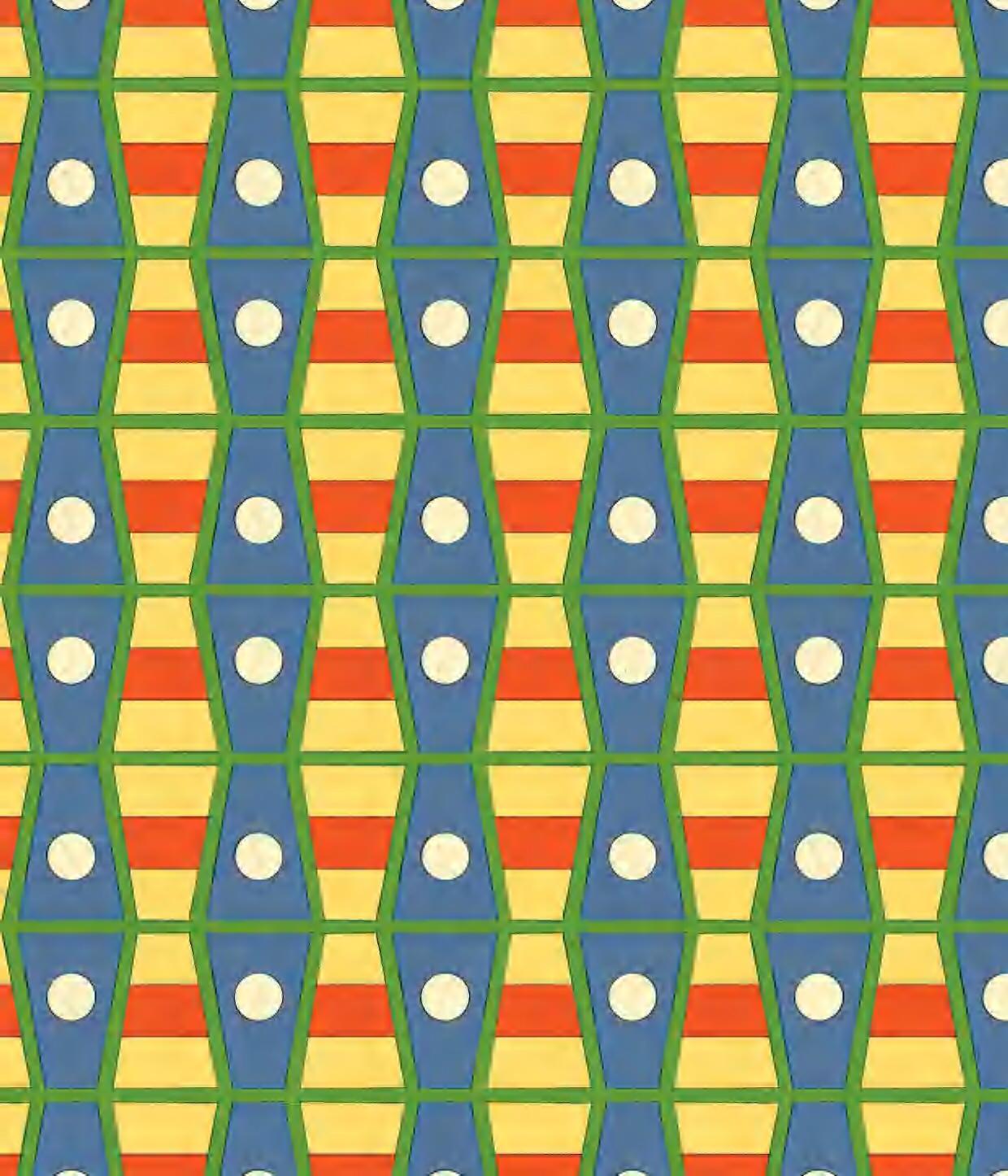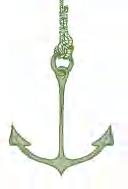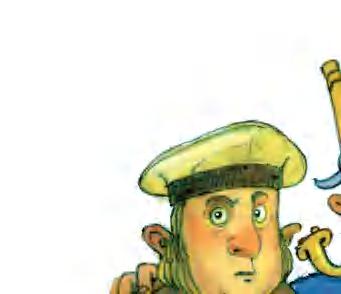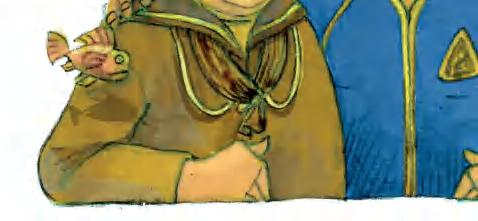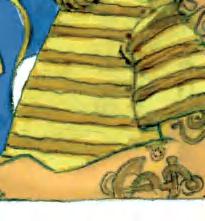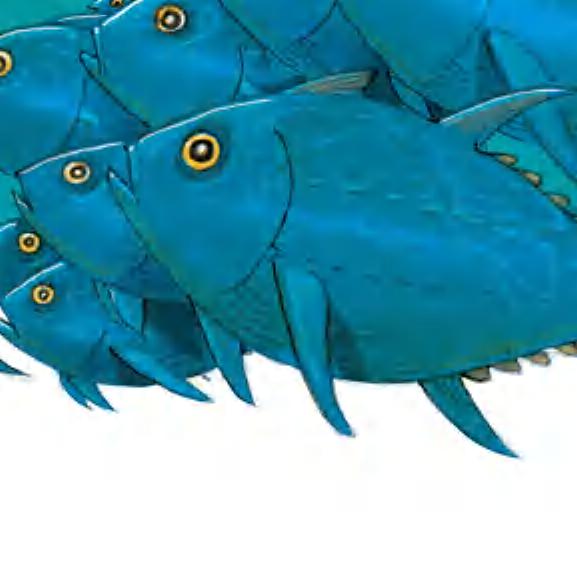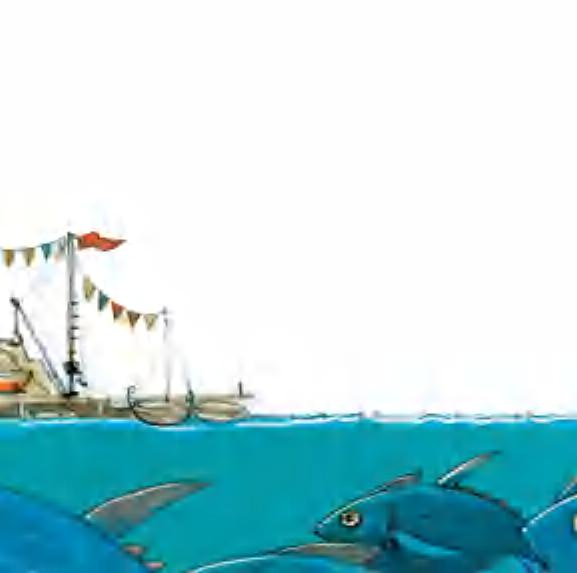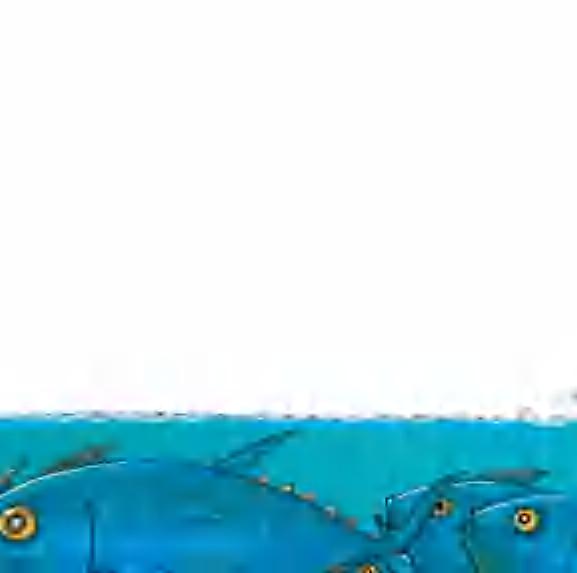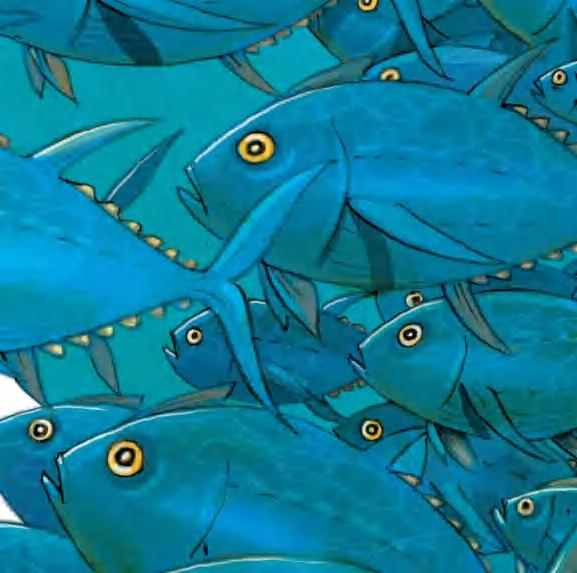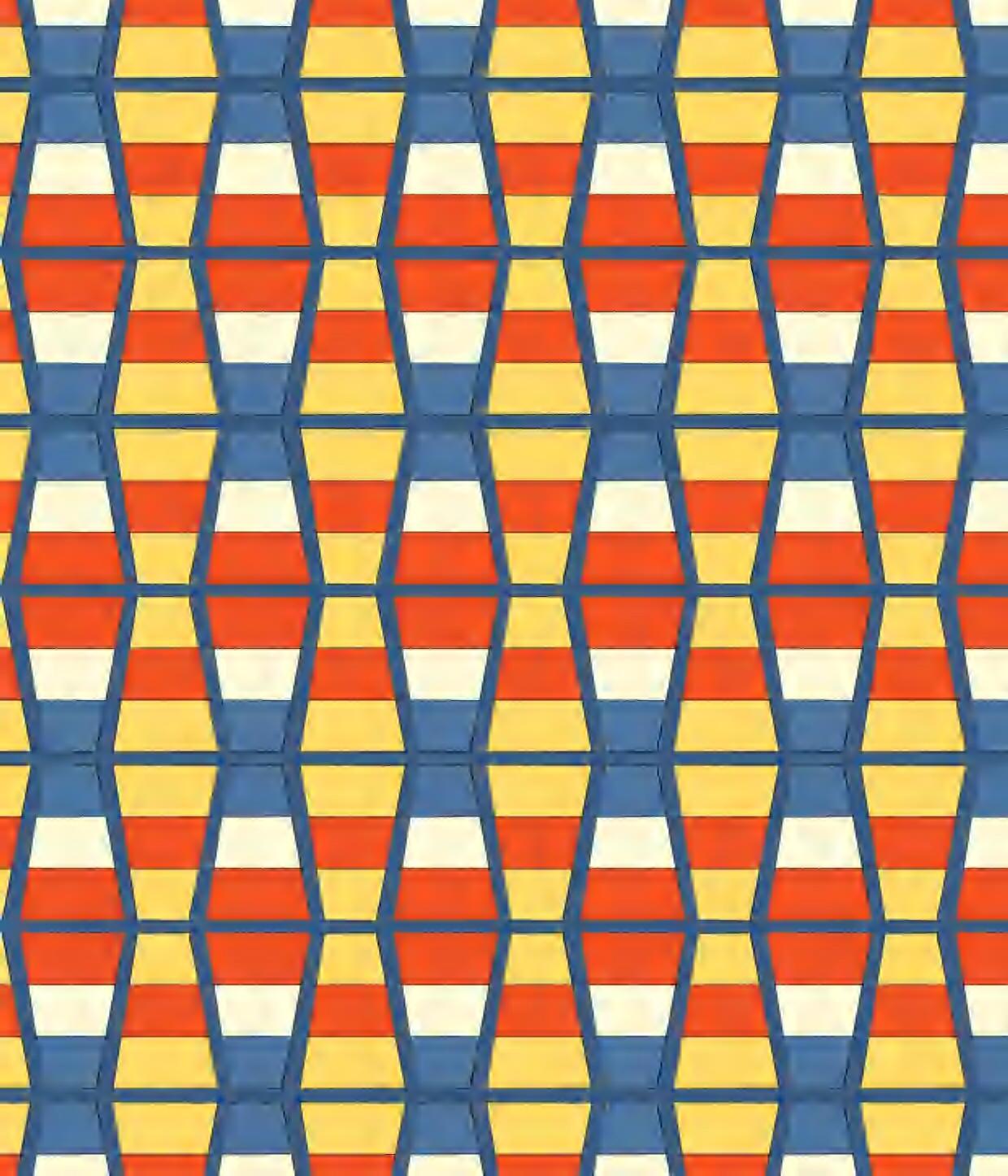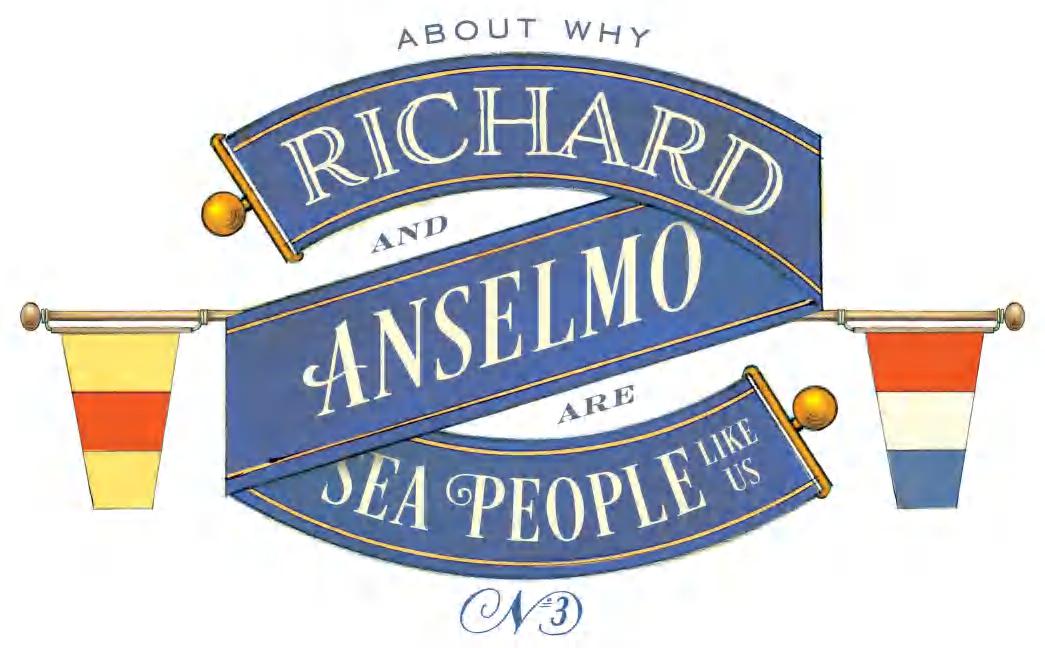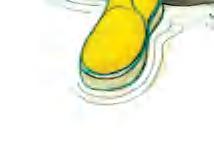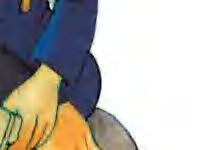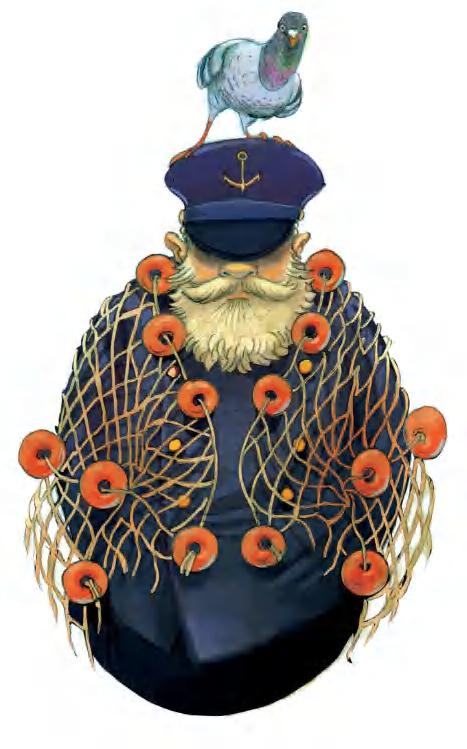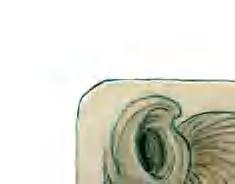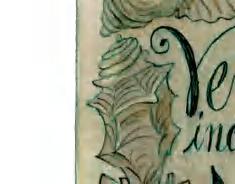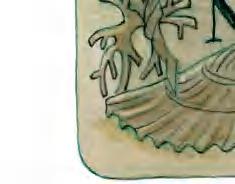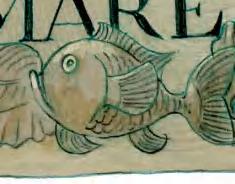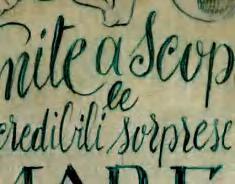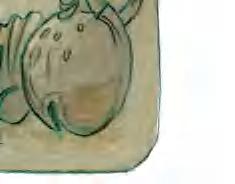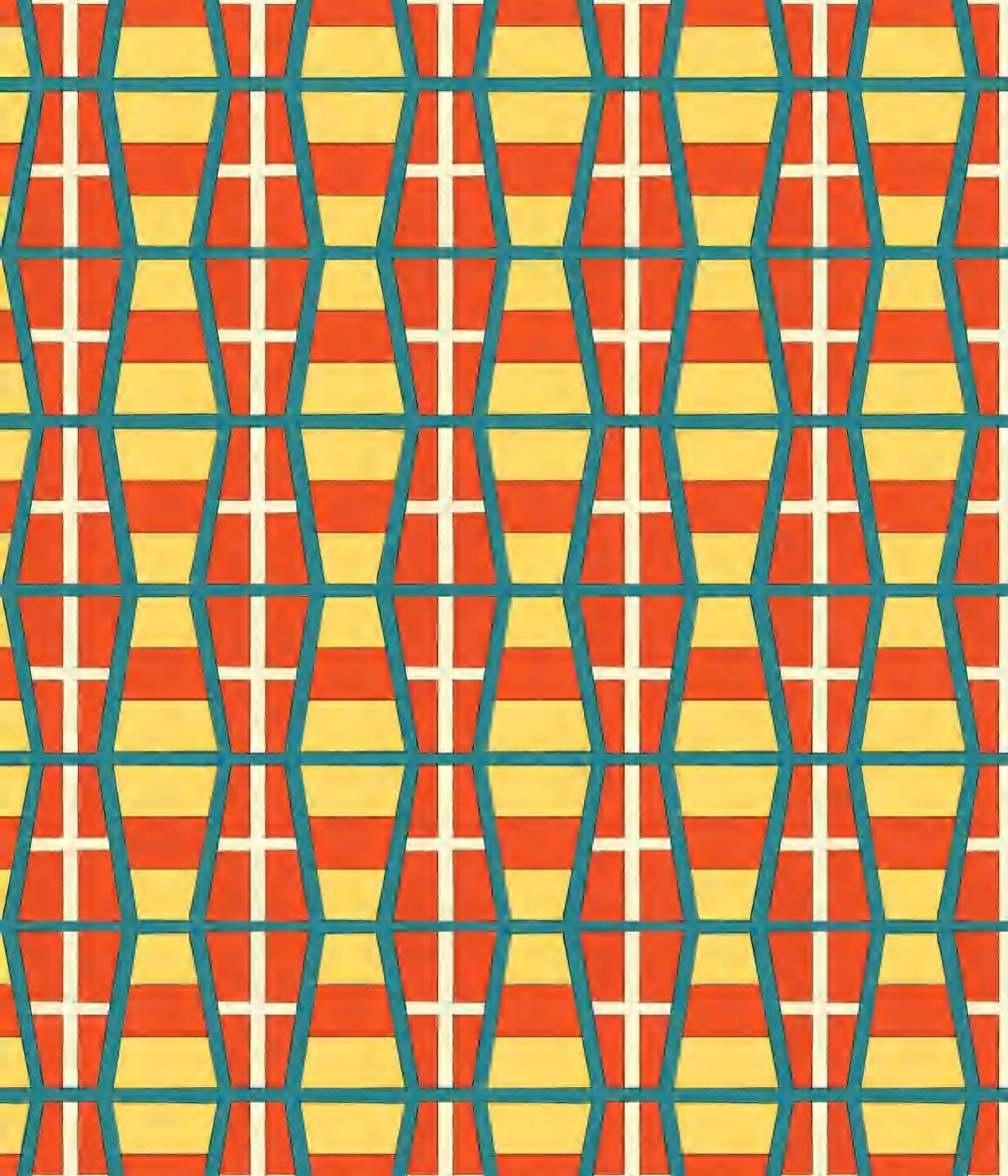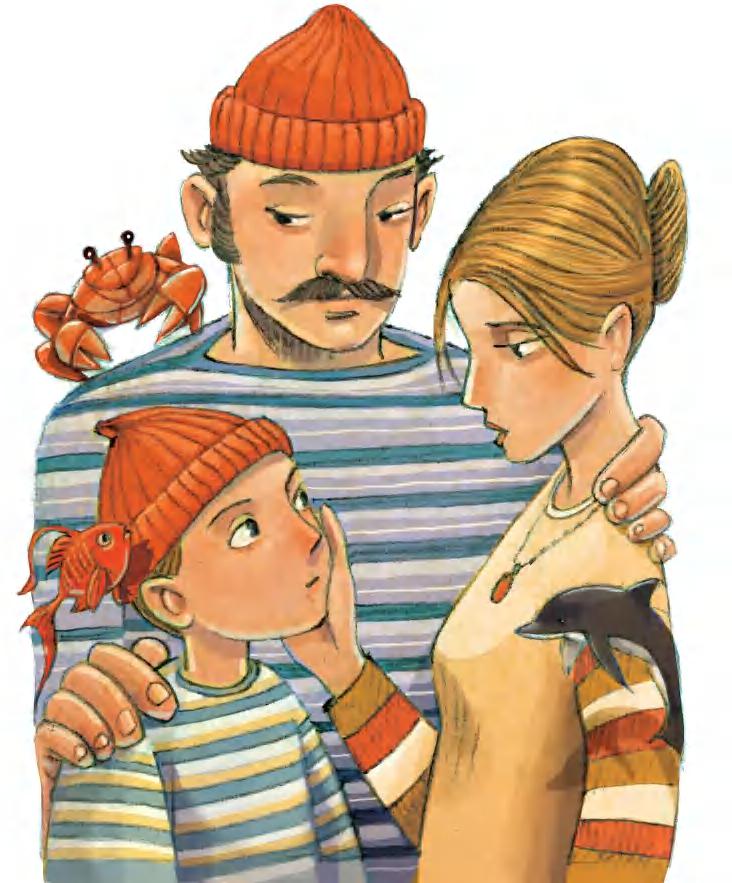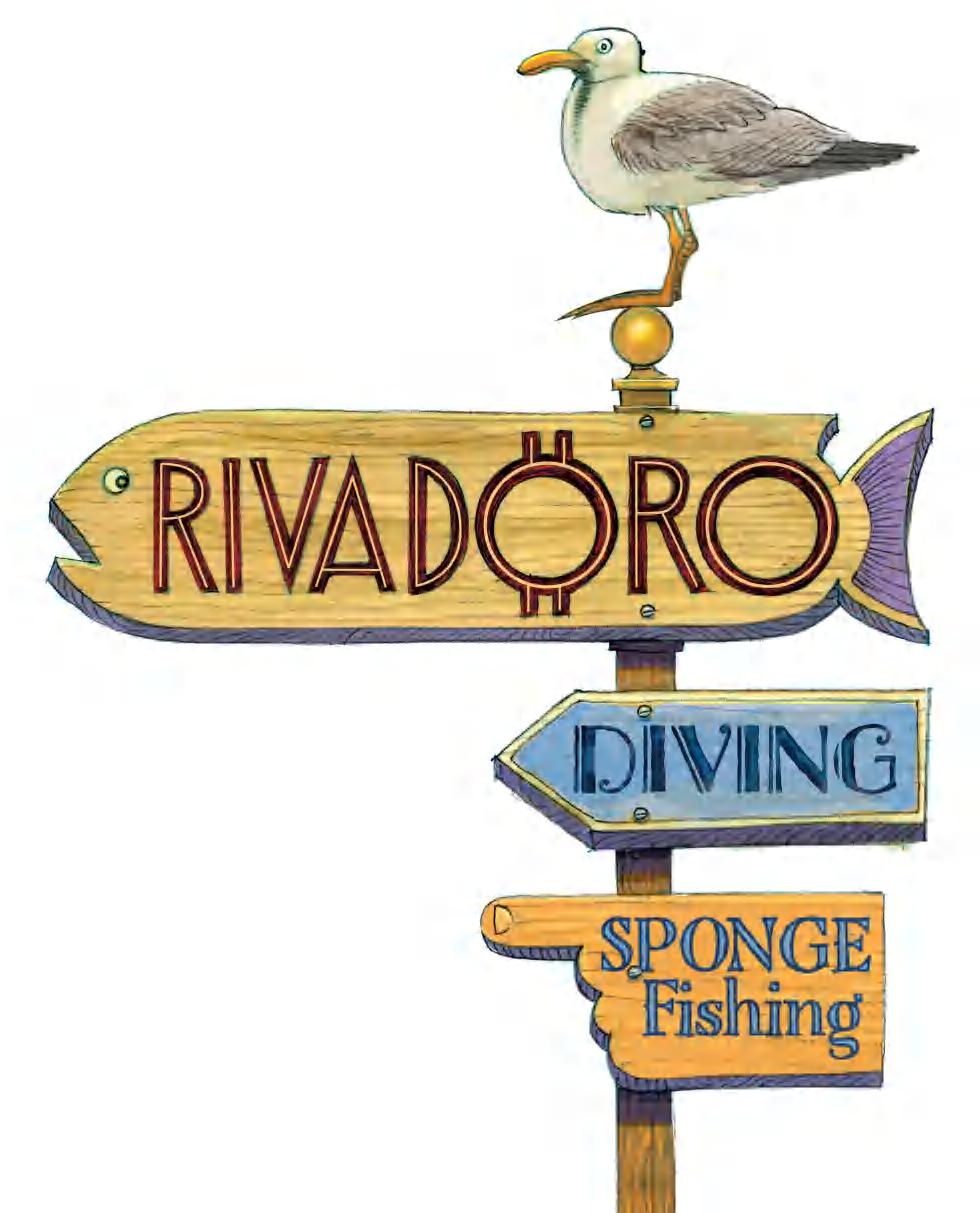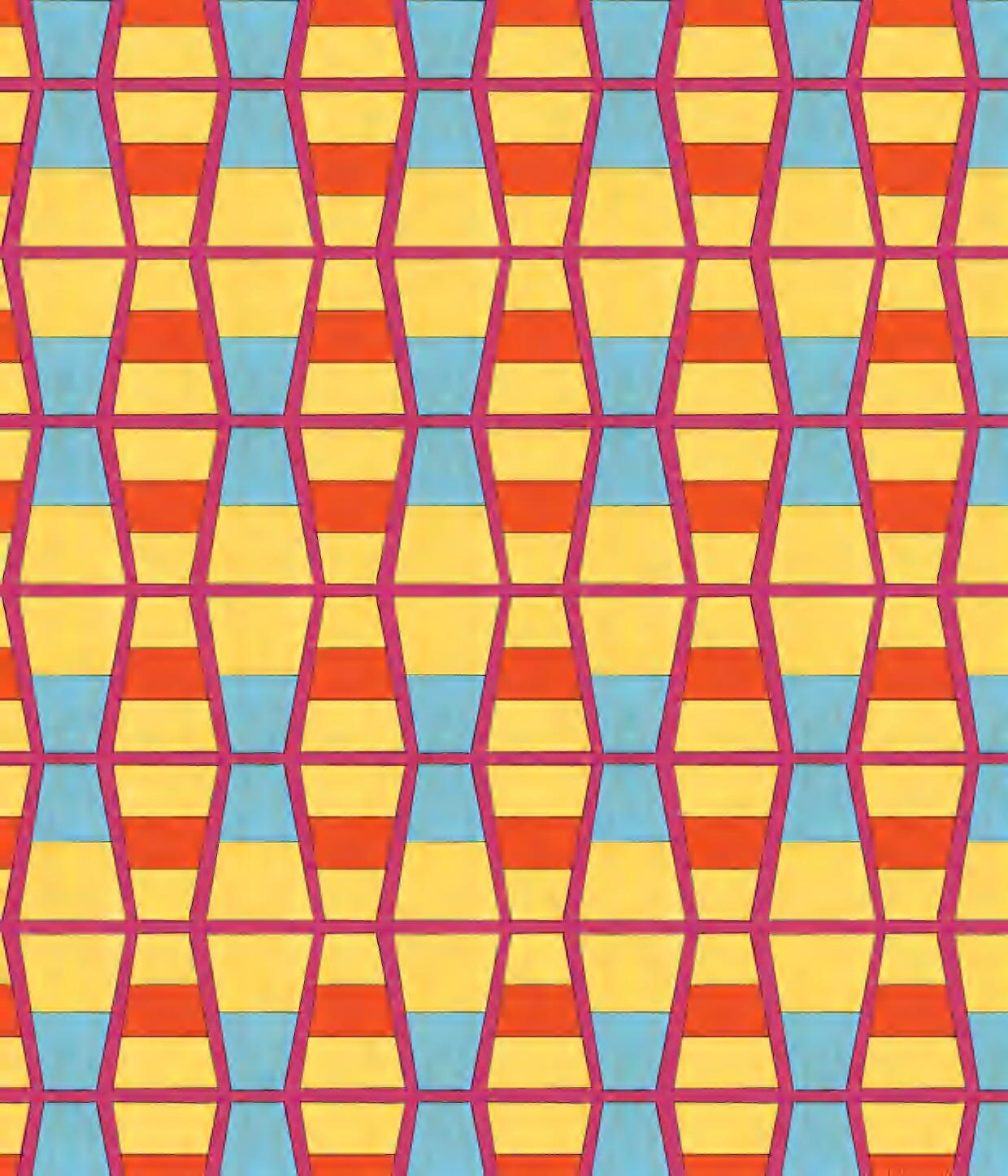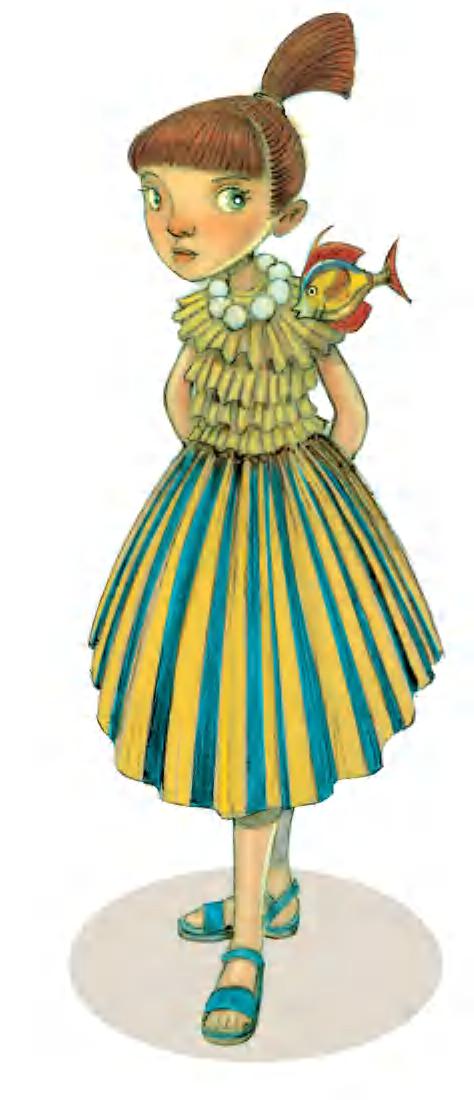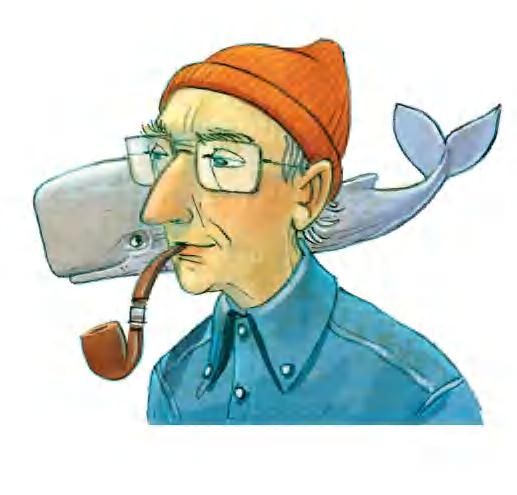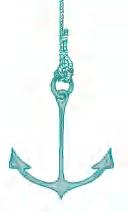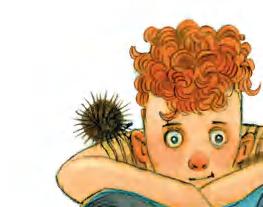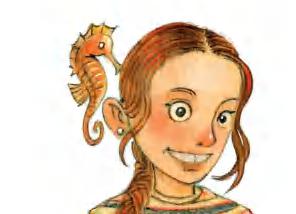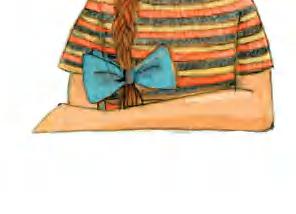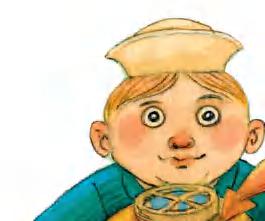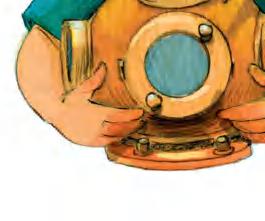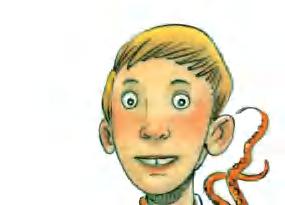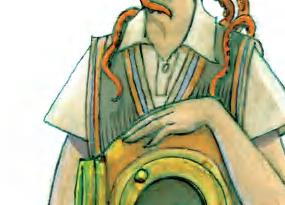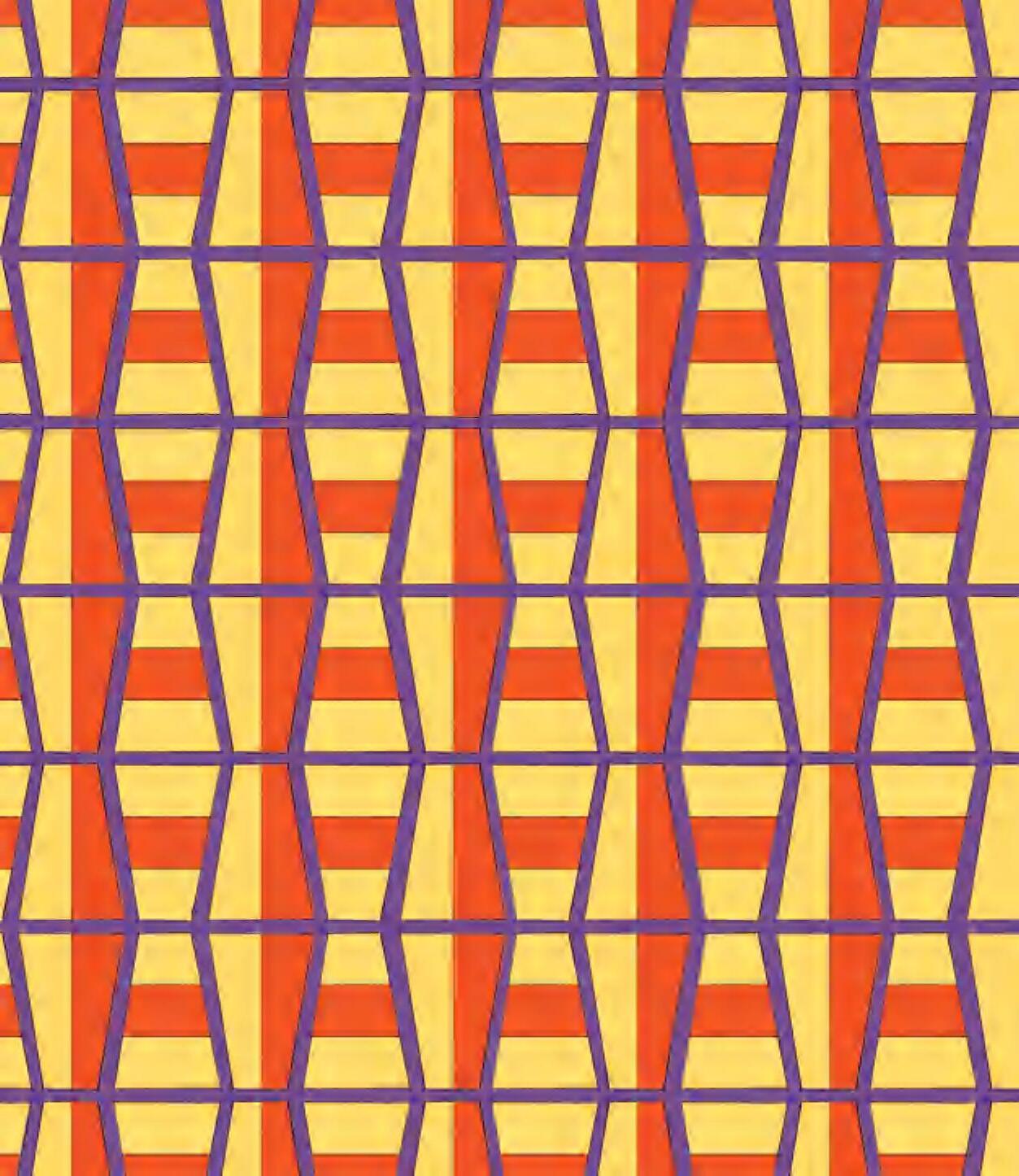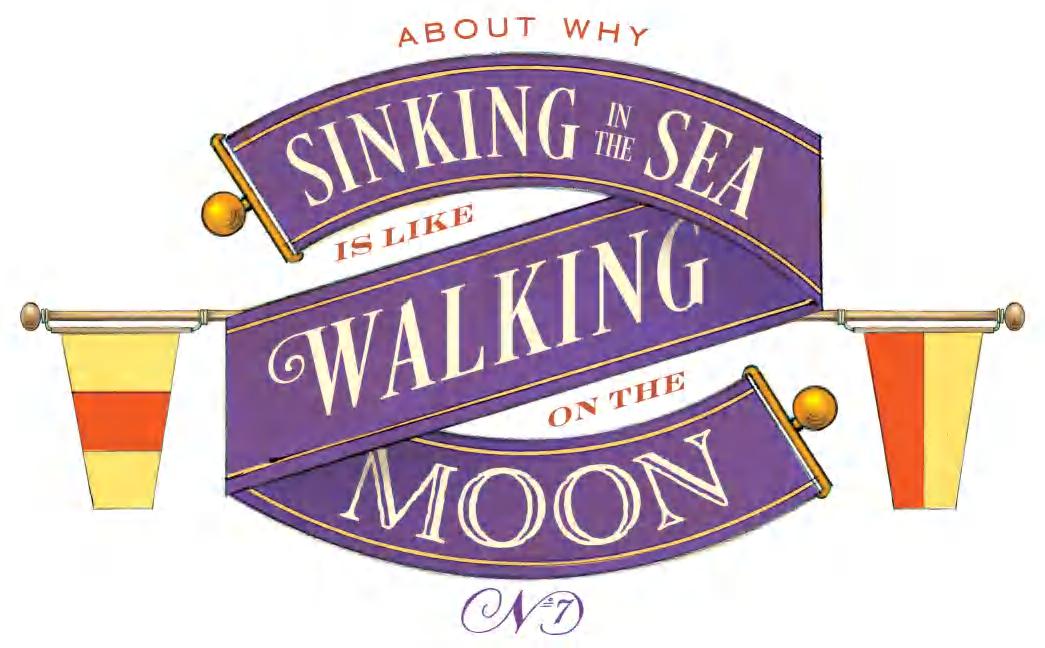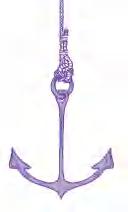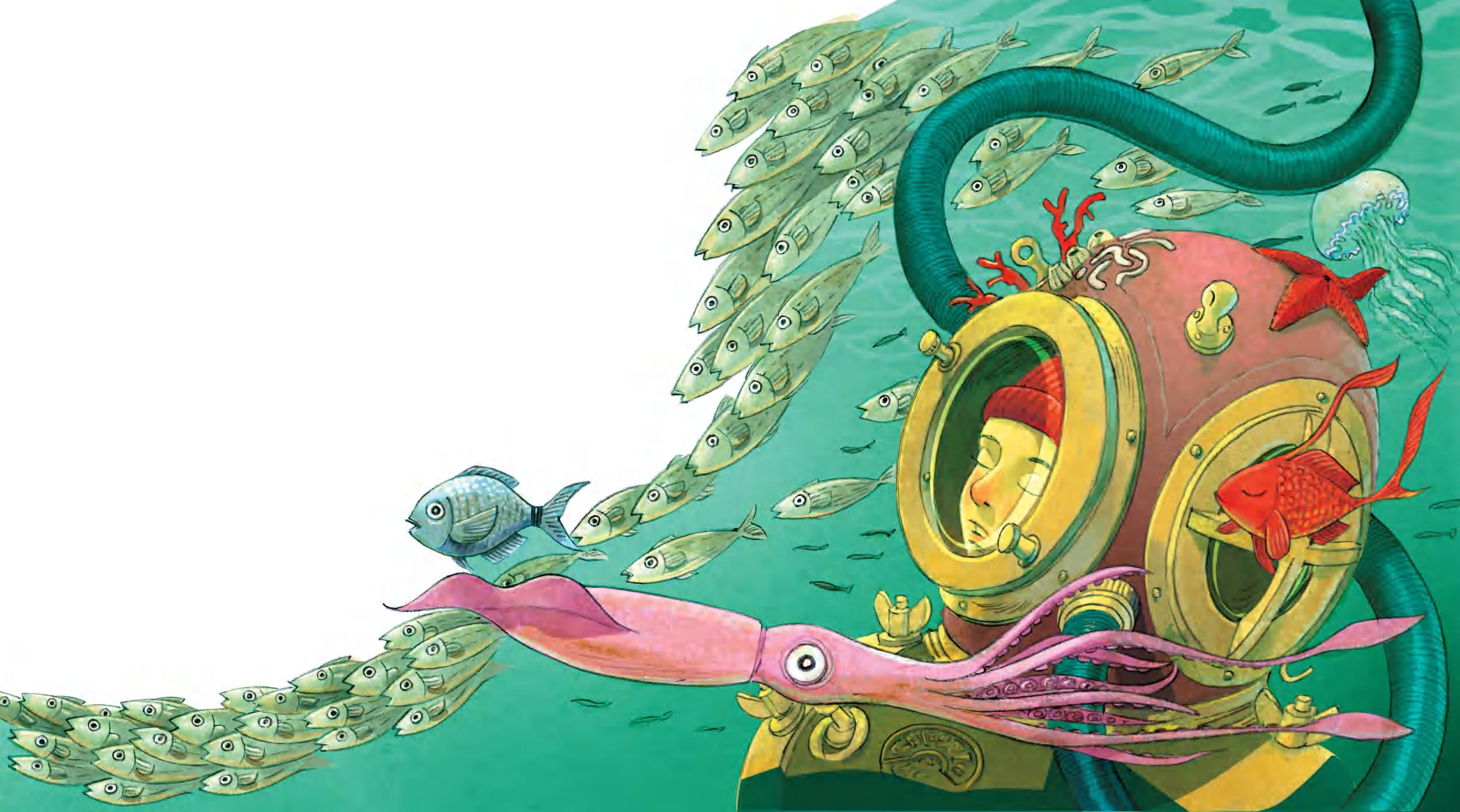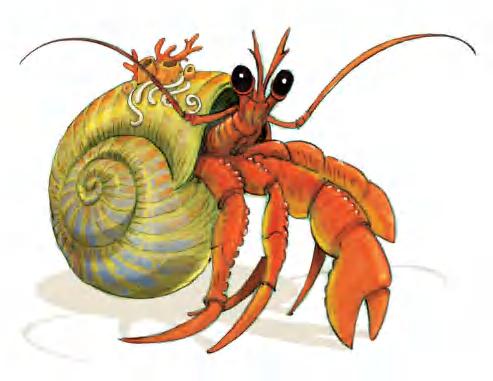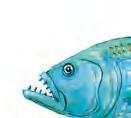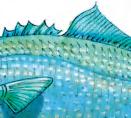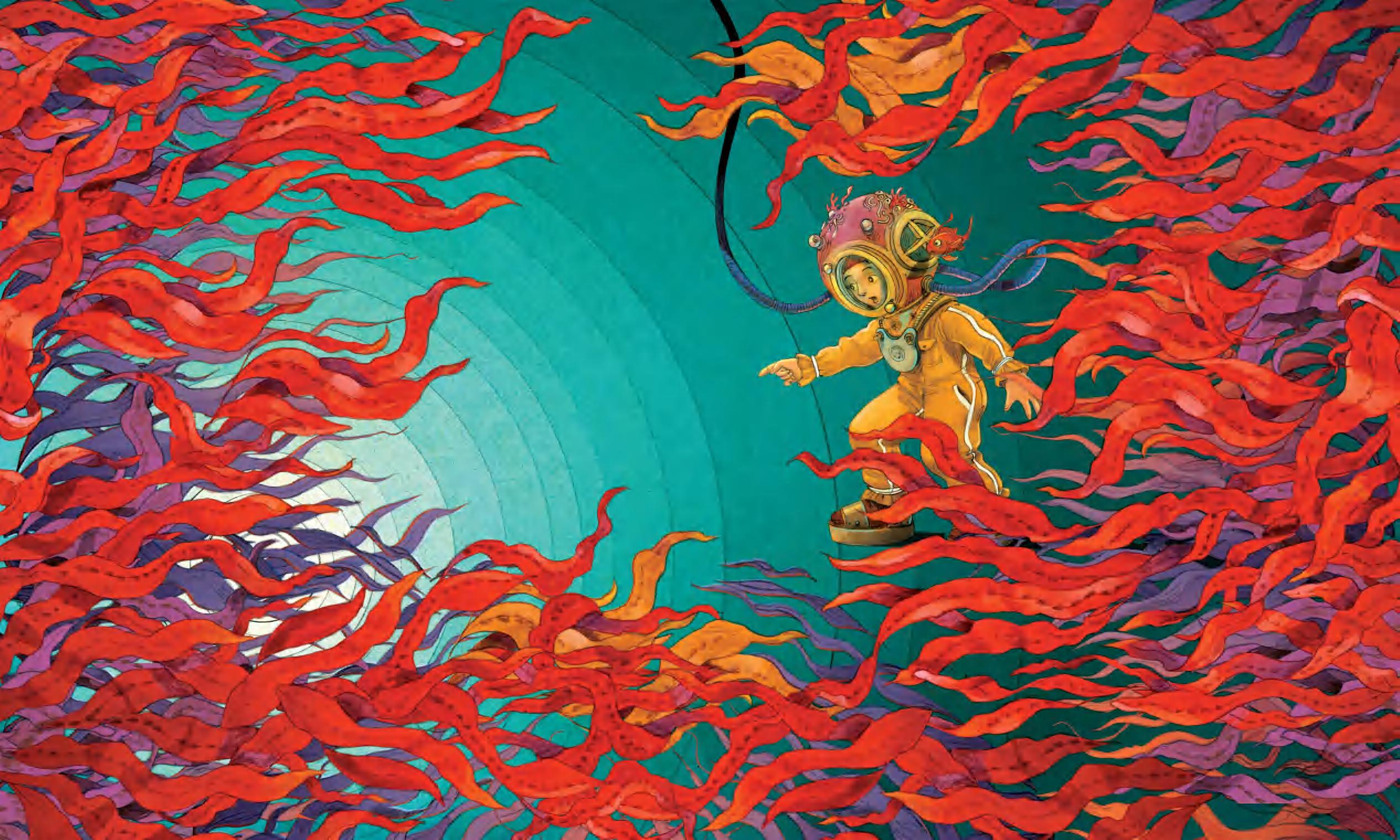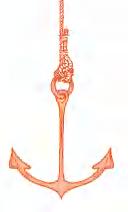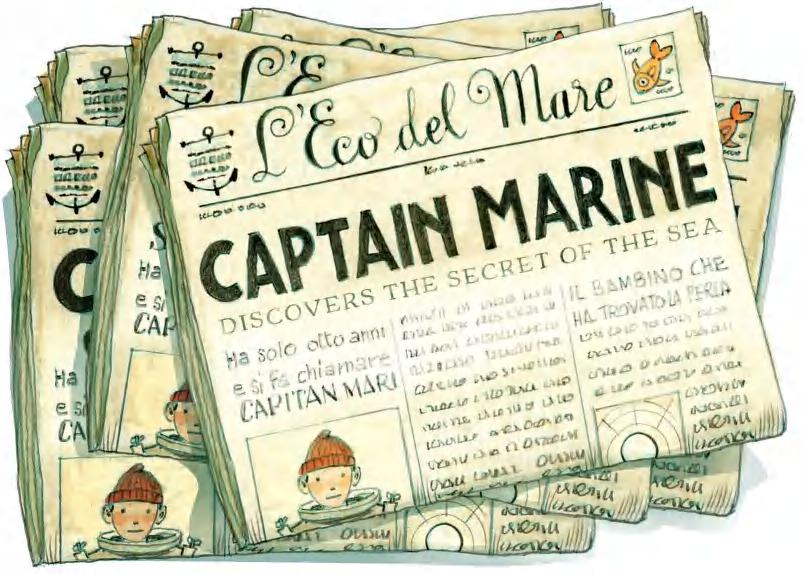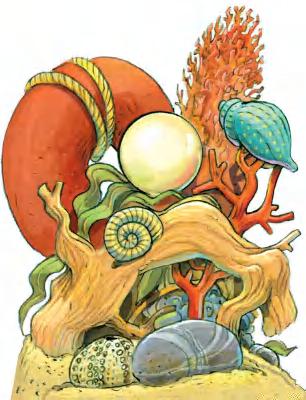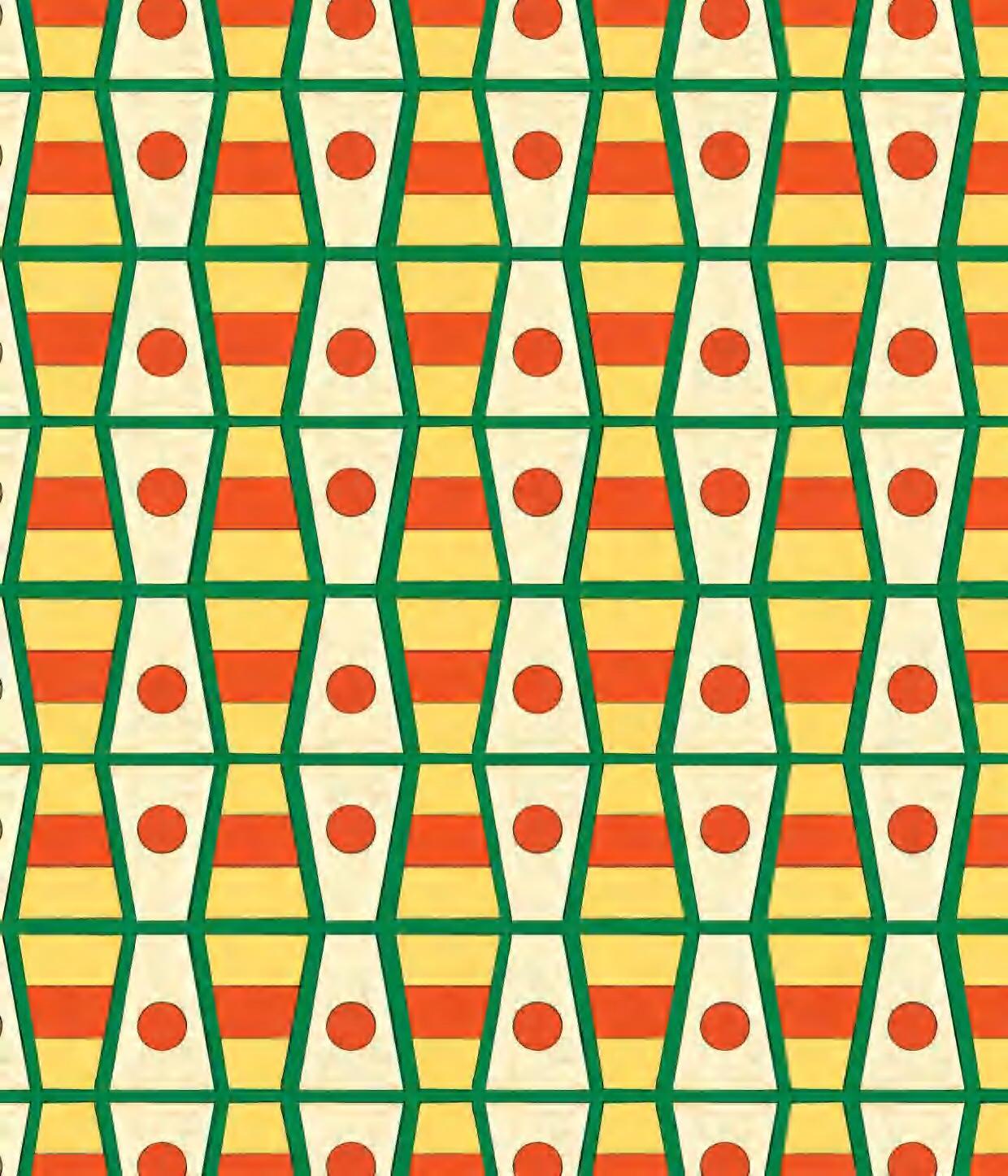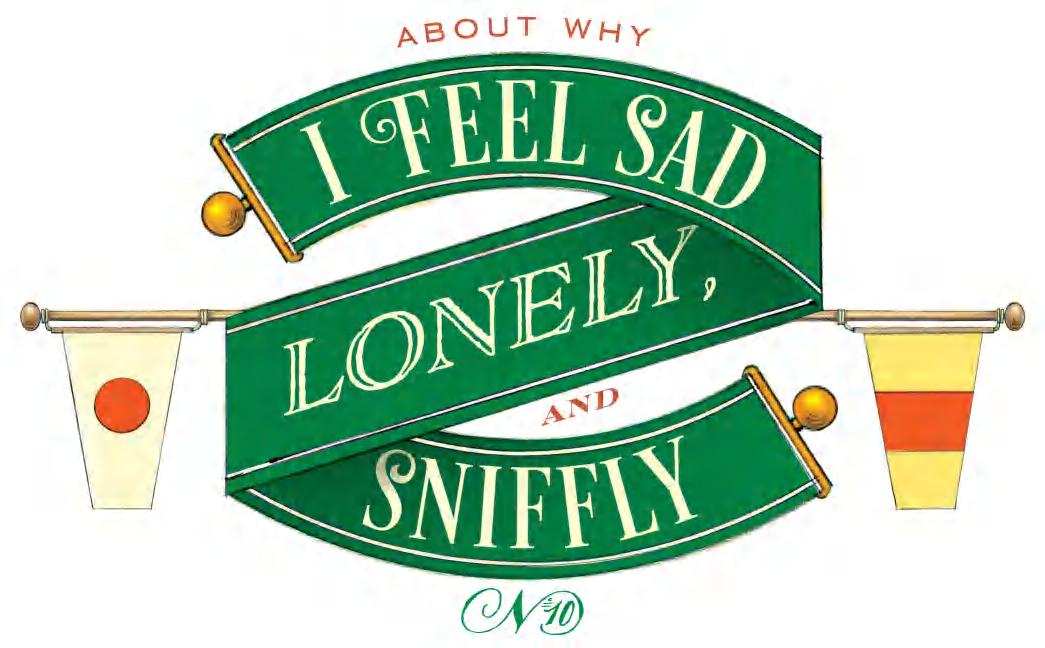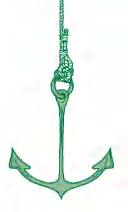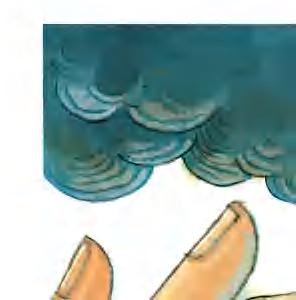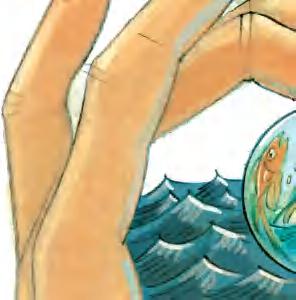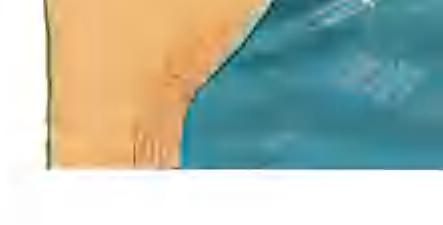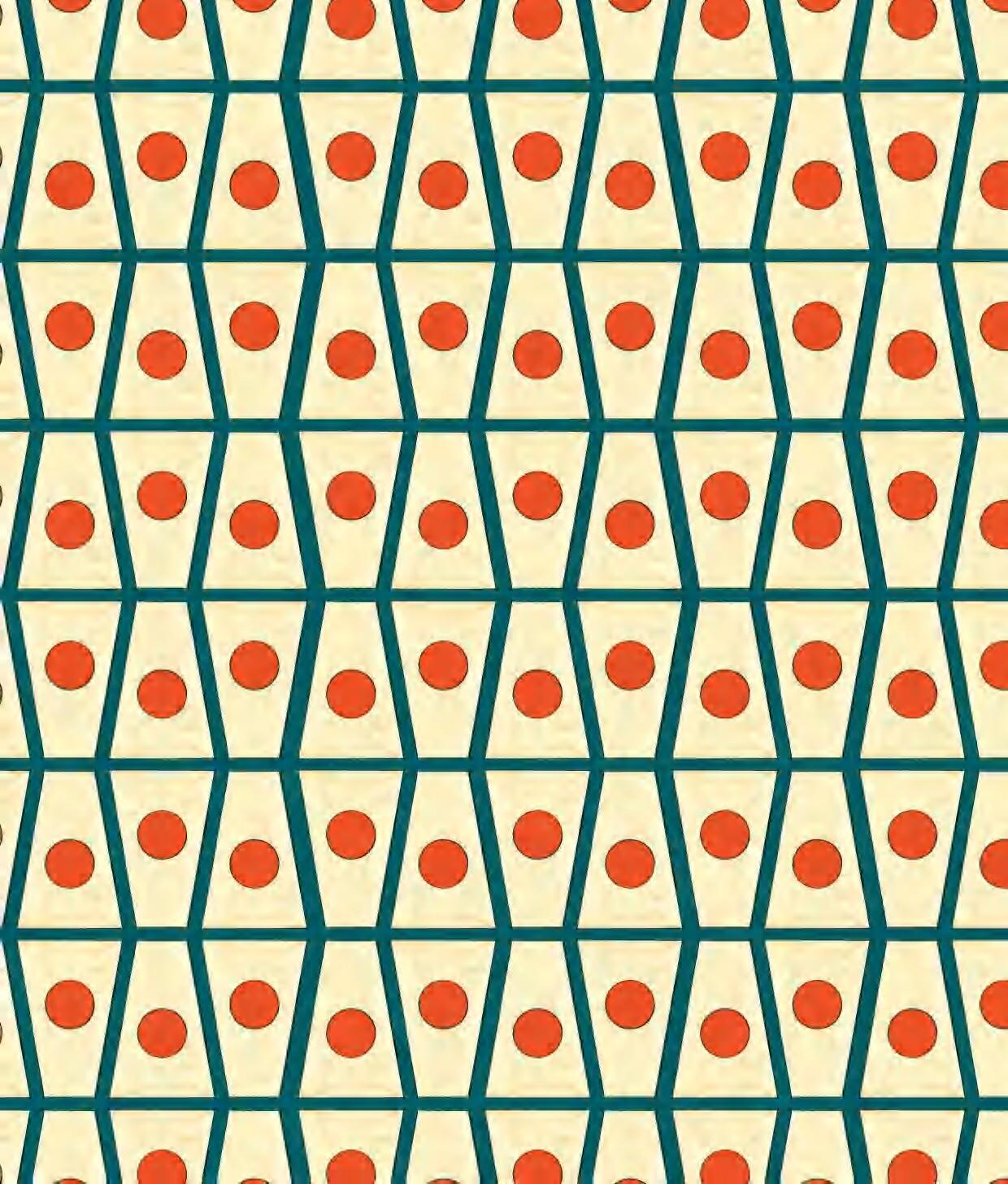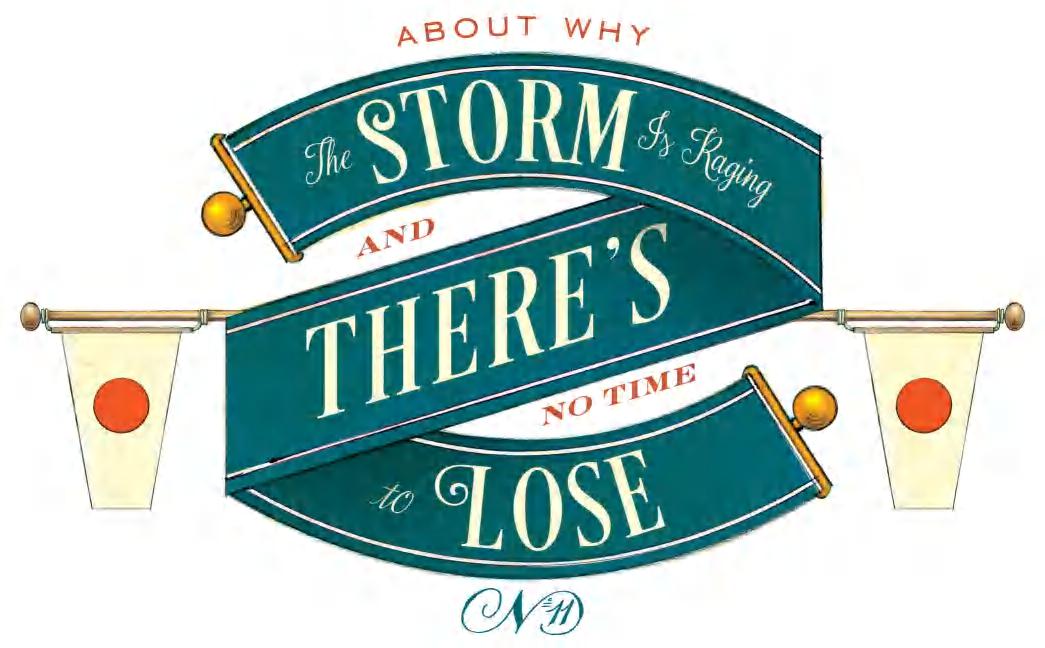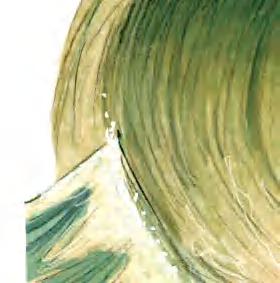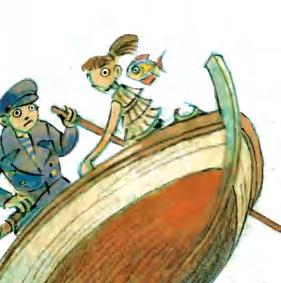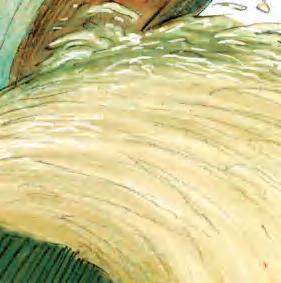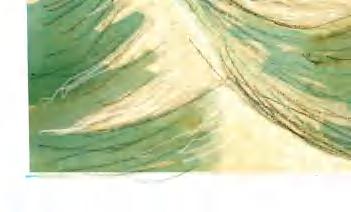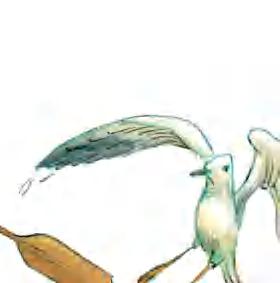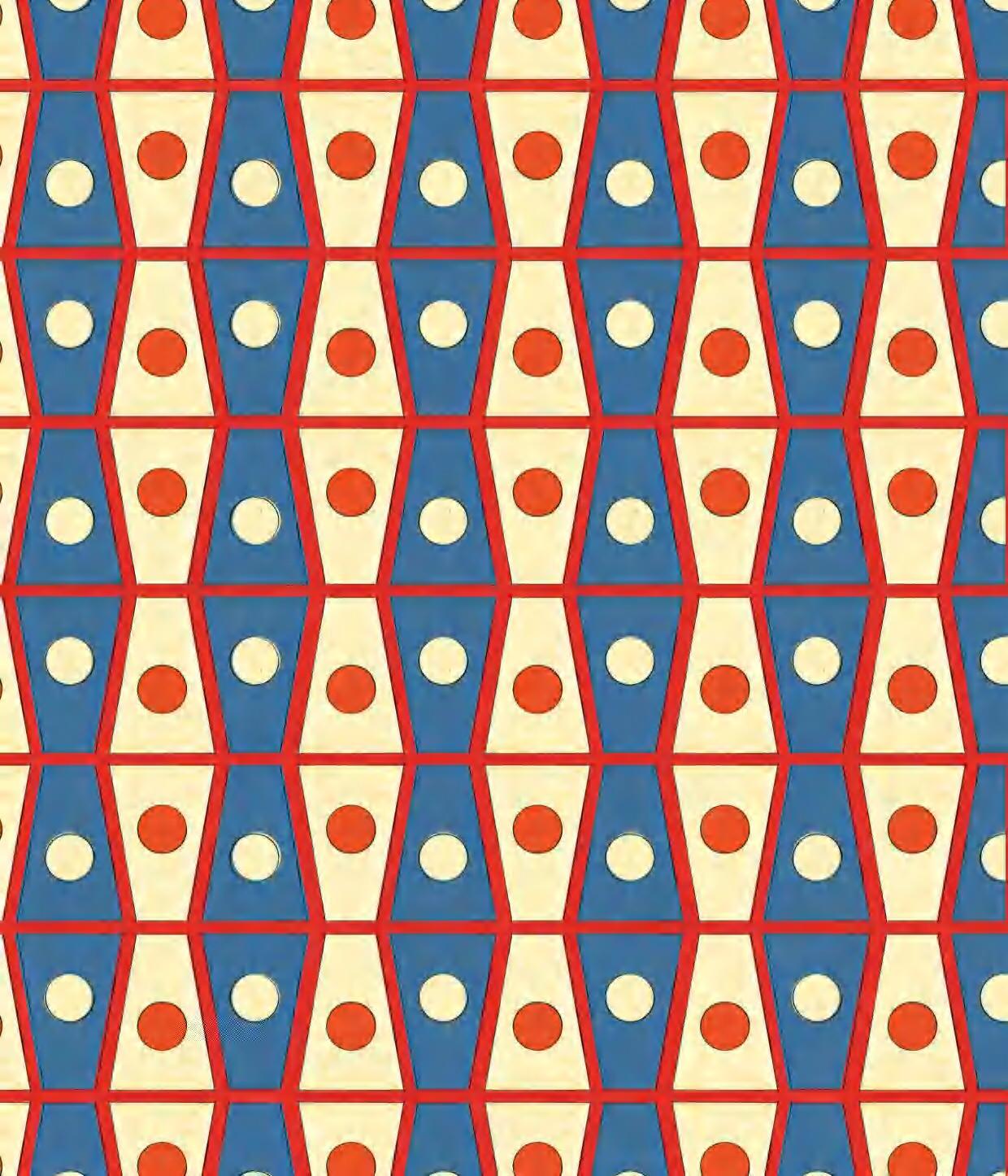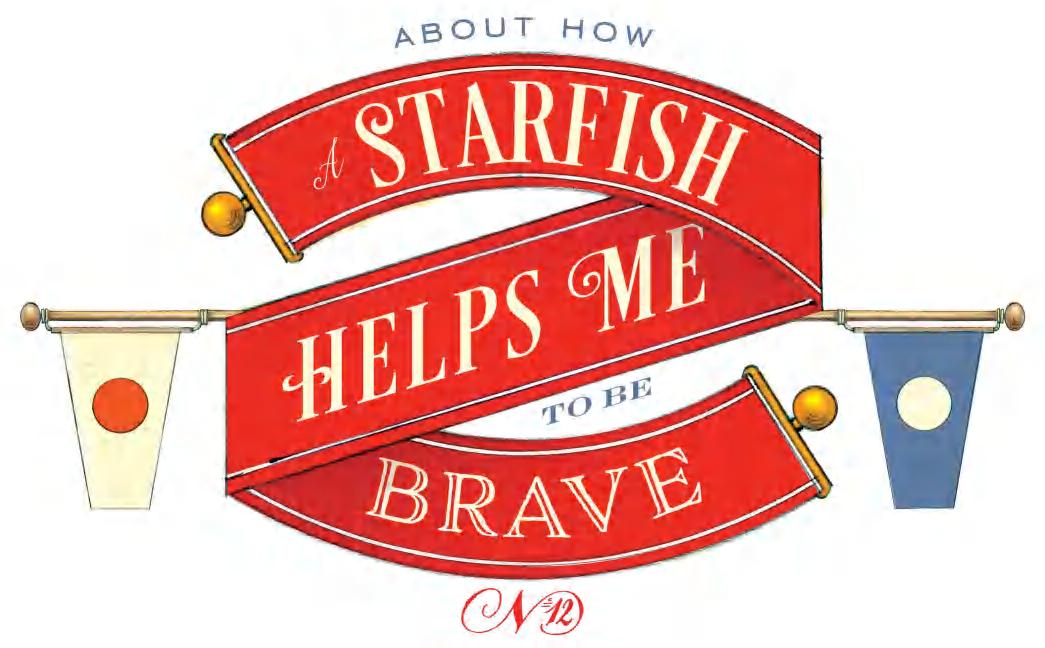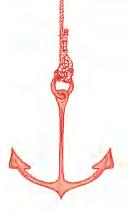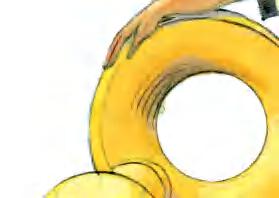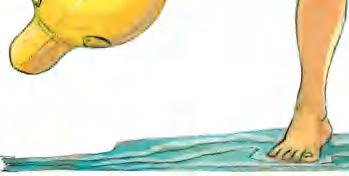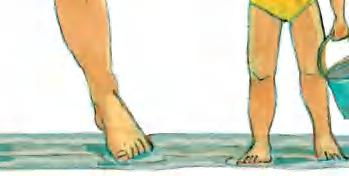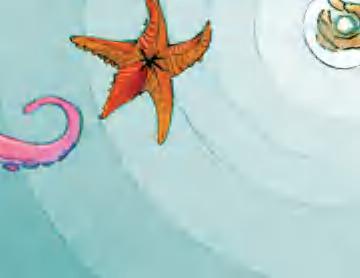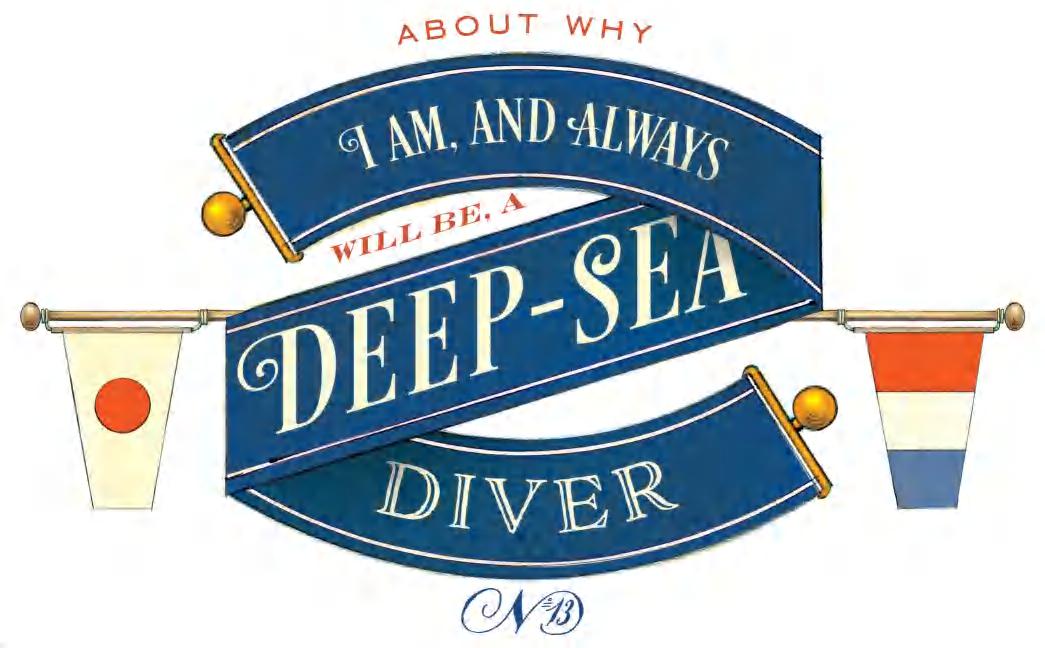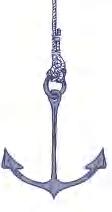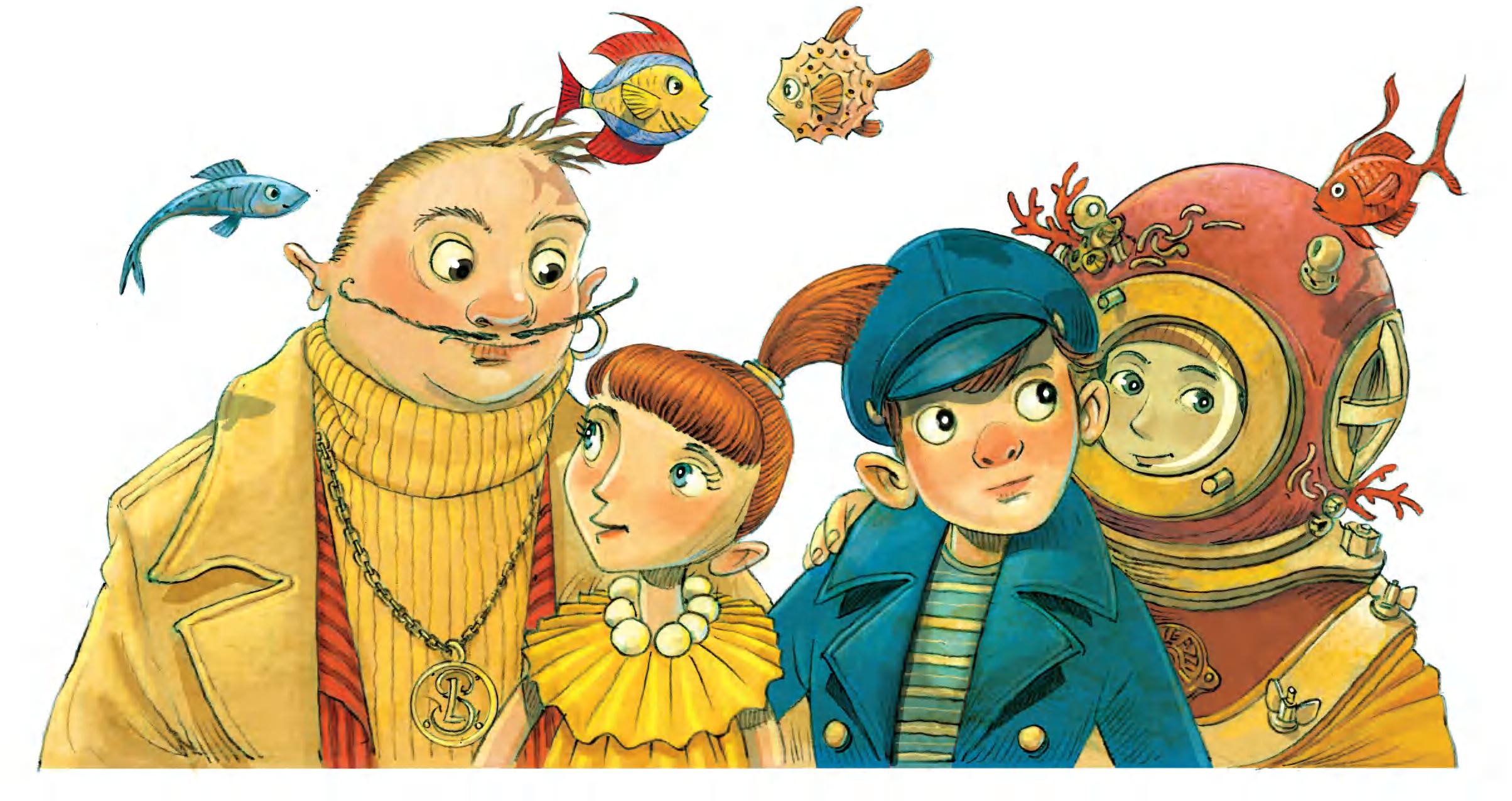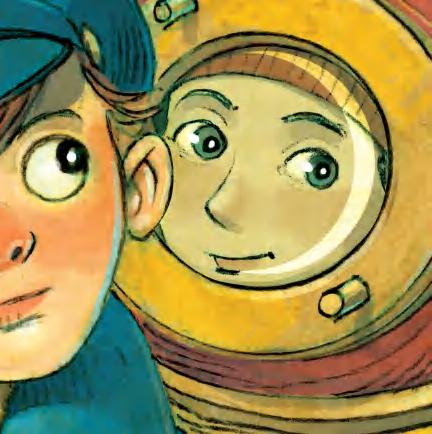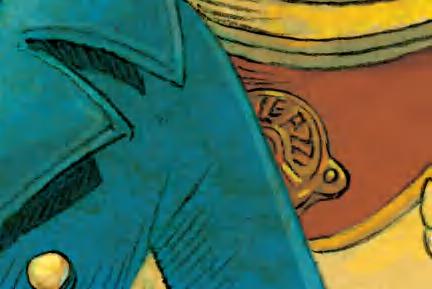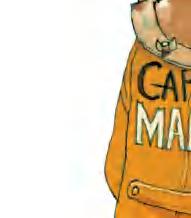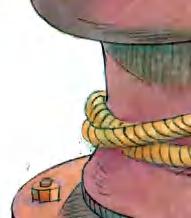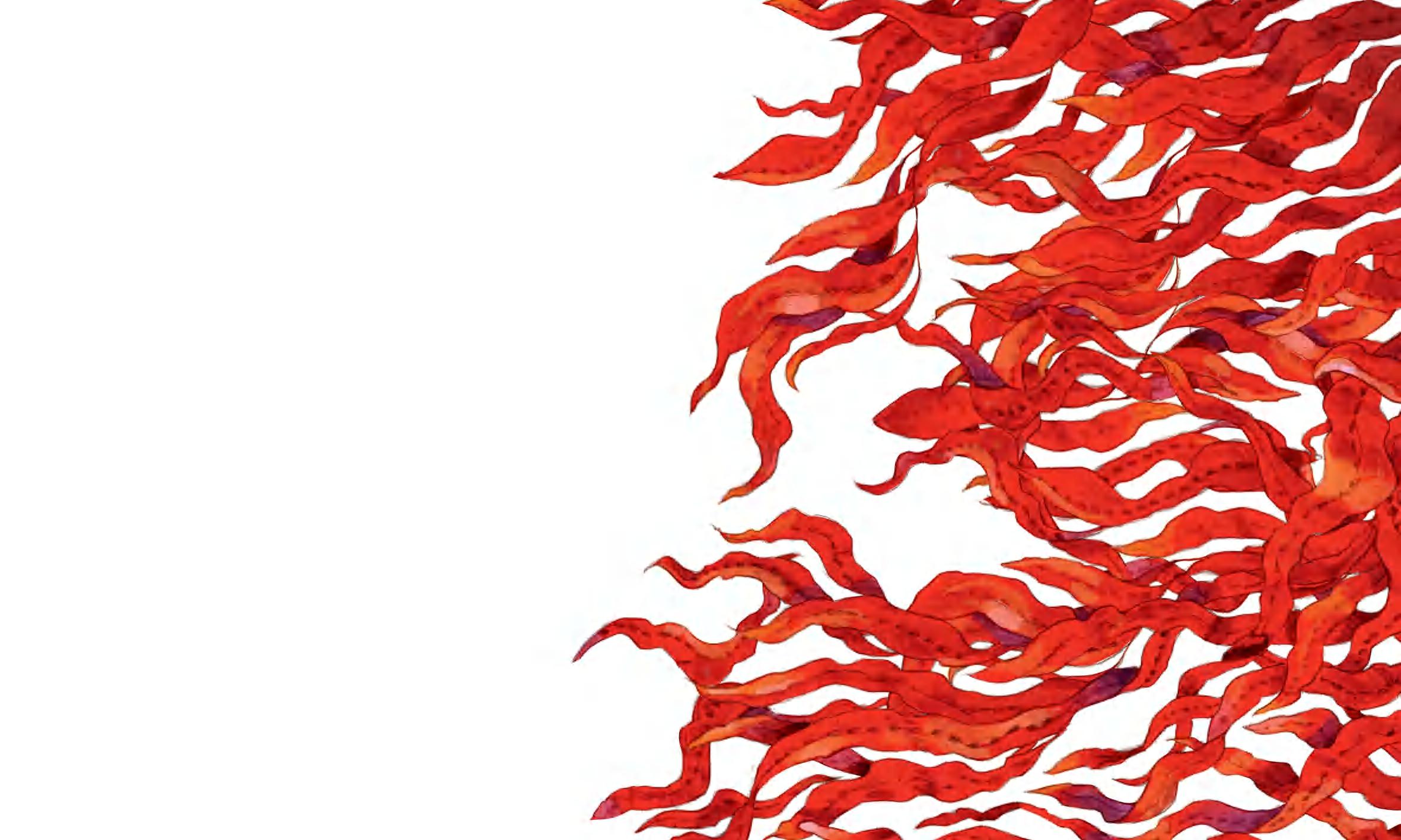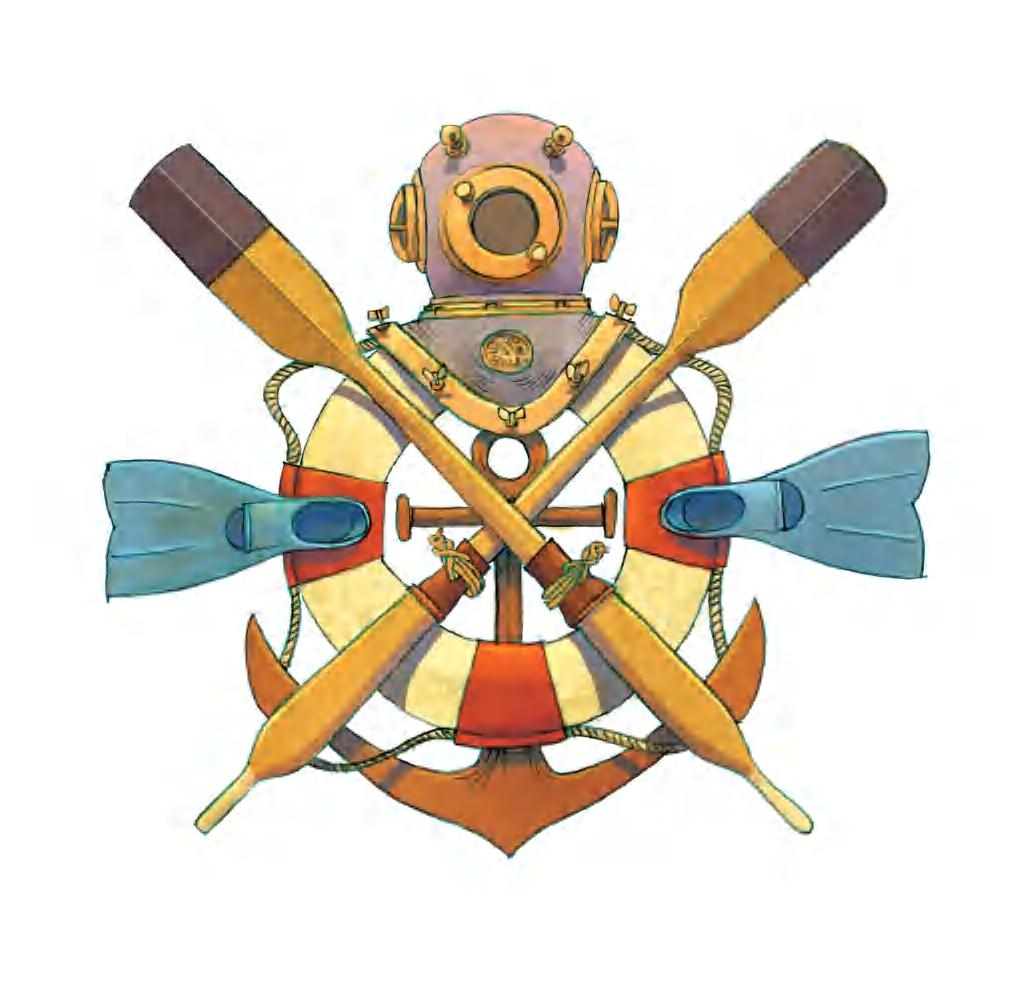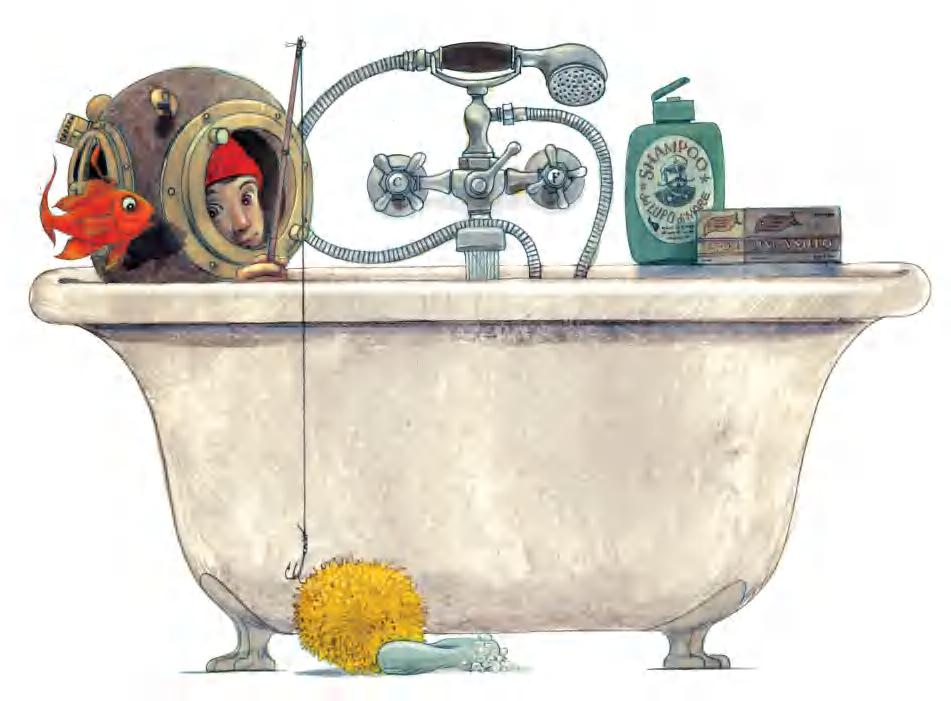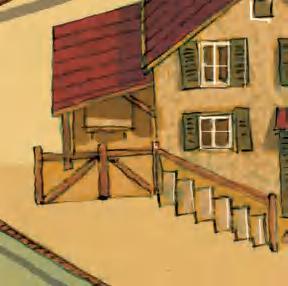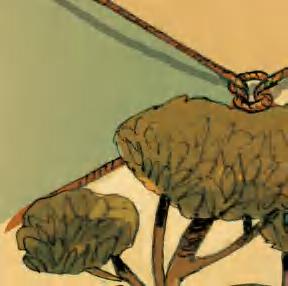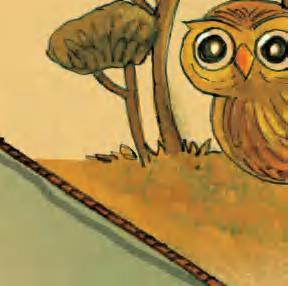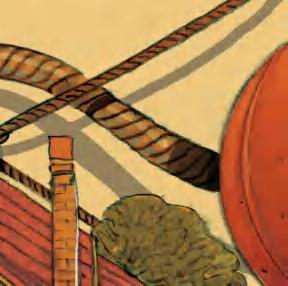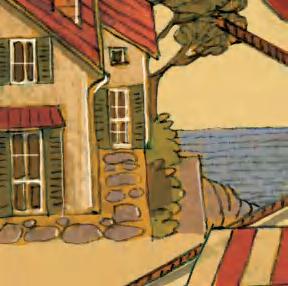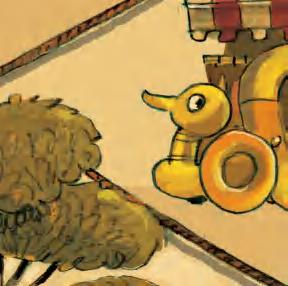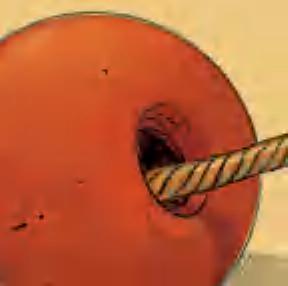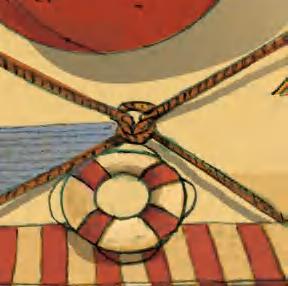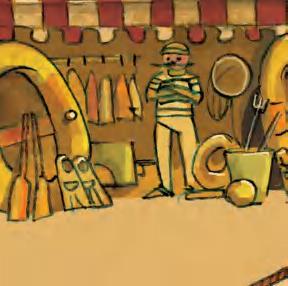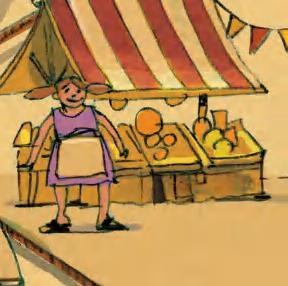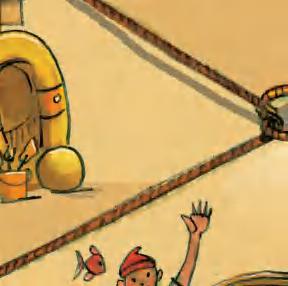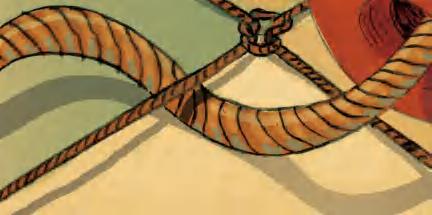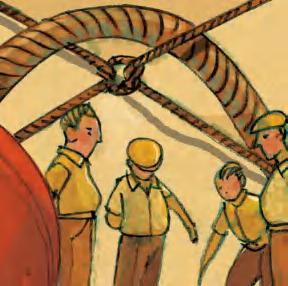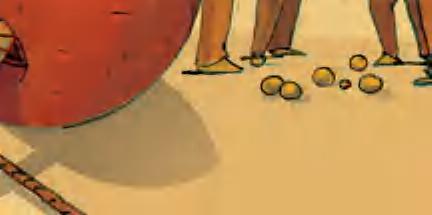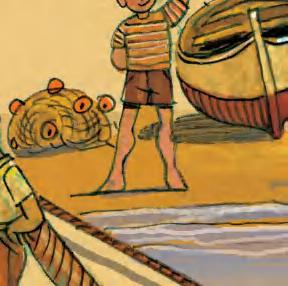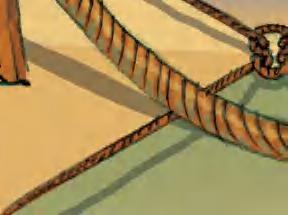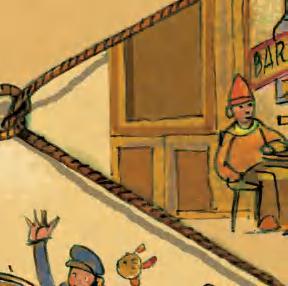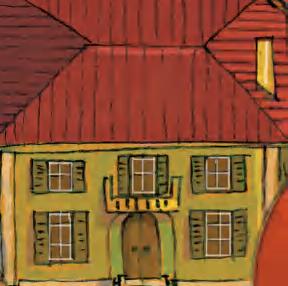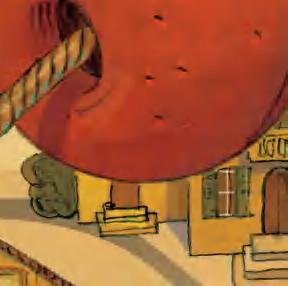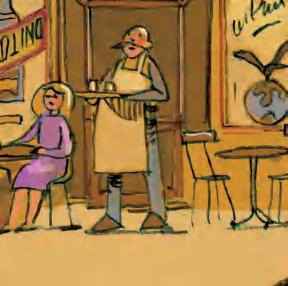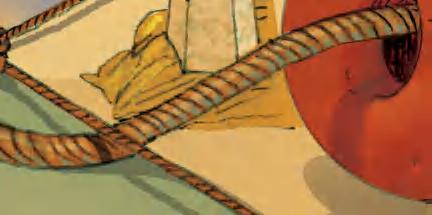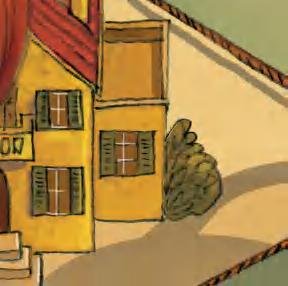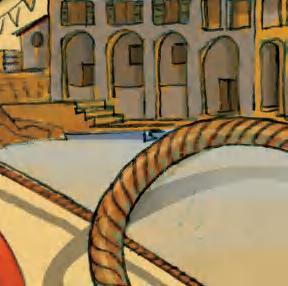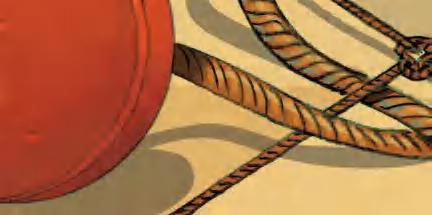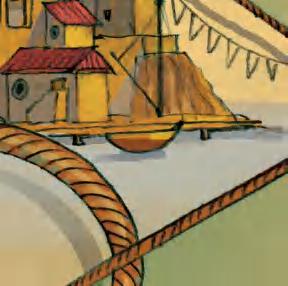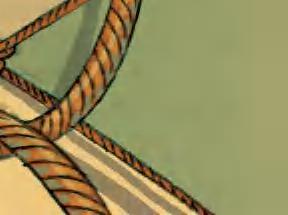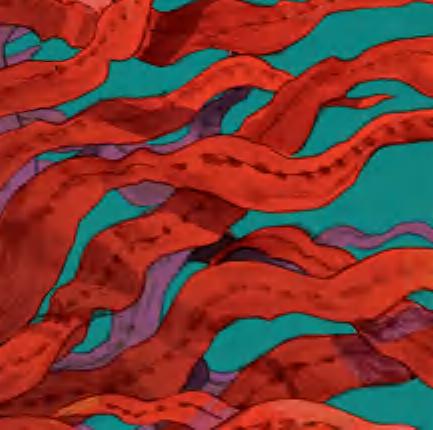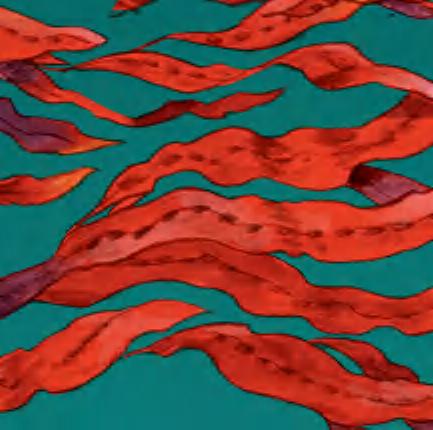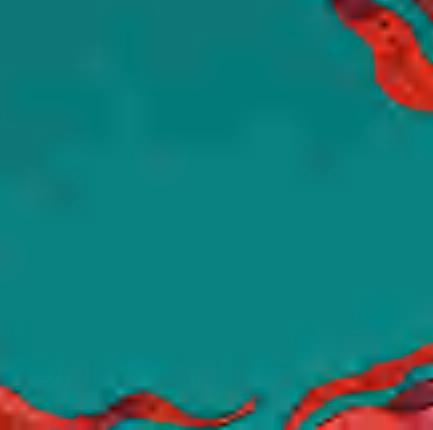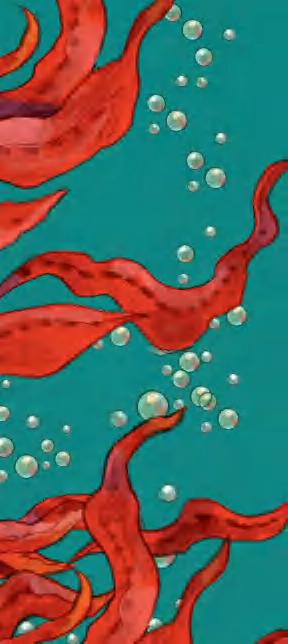Bluefish
statue has been here for a long, long time. It’s of a very tall man in a tunic that goes down to his feet and his arms are raised toward the sky. He’s the protector of sailors, and there’s a tradition for people to visit him on their first dive. Tiny fish swim all around him, creating a spiral of flowers. Some green seaweed drops off one of his arms. I watch it as it settles down to the bottom.
Just then I notice a light shining between the statue’s ankles. I go closer, and the light flashes on and off, as if it’s calling to me.
Mullet
There, almost completely buried by sand, I find her. I find the Pearl! I brush the sand off her and a white glow shines all around us. I look into Dad’s eyes through the glass of his helmet. He’s staring and waving his hands like a madman. Then he does a few somersaults. He’s very happy! He keeps smiling as I rub the Pearl. Her energy enters my body with a force like being hit by a wave. She’s wonderful, and she doesn’t seem at all frightened by us since she’s not trying to bury herself back under the sand.
The impulse to show her to Mom is too strong to resist. So I gently scoop her up between my hands.
The next day, the newspaper headlines are all about me:
“Captain Marine discovers the secret of the sea!” “Eight-yearold boy finds the Pearl!” “Captain Marine and the Pearl!”
It was Mom who phoned Ludovica Martinelli, a journalist with our local newspaper and our nextdoor neighbor back at the Marina.
According to Mom and Dad, good news should be shared. So, the good news was soon on the TV and radio and in the newspapers.
On TV you can see the journalists getting wet as they do their reports too close to the breakers on the beach. They talk about the “golden beach.” My parents and I sit in the living room watching and reading
all these things, while the Pearl sits on the bottom of a green bottle of mineral water.
The phone rings, and I answer. It’s a journalist with a high-pitched voice. “Hi there, Captain Marine!” he says. “Did you know that this pearl you found is worth a lot of money?” Then, without giving me time to answer, he asks, “What do you want to do when you grow up?” I think about it. I look around. I’m so confused and so happy that nothing makes sense,
and I can’t think of an answer. Dad’s smoking a pipe. He hasn’t smoked since Grandpa died. A decision has to be made: What should we do with the Pearl?
Like every time we need to make a decision, Mom is the one who eventually does it: we have to take the Pearl back to the sea. But before doing that, she says, we should put it on display so that other people can admire it, too. Mom always says we should share beautiful things.
I suggest that we dedicate a whole room of our house—mine—to the Pearl, like a museum. It’s no big deal for me to sleep on the couch.
The first day is a big success: hundreds of people line up to see the Pearl, which shines with a glow that takes everyone’s breath away. No one needs a flash to take a photo: the Pearl shines with a light of her own. I’ve left all my posters up in my room so people can look at them, too, because they’re so good.
SOMETIMES
PEOPLE
At school, the kids all look at me with their eyes full of admiration. I’m not Hector anymore but Captain Marine. Everyone wants to know how I found it. And they all look so riveted that I even tell one kid that I fought a shark to get it. But it’s a lie. Even Carlotta, who always spends recess by herself, seems to be interested in me because of the Pearl, and she sticks to me like
an anemone to a rock. She is very annoying, because she waits for me every morning on the steps outside the school, so we always end up going into class together, even though she never says a word. Richard pretends to look out the window, but I know he’s only doing that so he doesn’t have to look at us. (All you can see out our classroom window is the restrooms, and they’re really not worth looking at.)
BECOME FAMOUS FOR SOMETHING THAT SEEMS TOTALLY NORMAL TO THEM.
I’m not too sure if Carlotta’s father, Amedeo Limonta, would be happy with her waiting for me like that, because the news that I’d found the Pearl made him furious. He went on all the TV stations, screaming horrible things about my father and me. He said that the part of the sea where I found the Pearl belongs to him and therefore the Pearl is his as well. And things like that. He’s so
angry, with his hair all messy, pacing up and down on the beach, sending up a dust cloud of sand. But his anger doesn’t stop people from wanting to see the Pearl, and more and more people are coming every day, even from other towns.
What surprises us more than the people, though, is Amedeo Limonta himself. A few days after his TV appearance he shows up at our house with his men. As if that isn’t strange enough, he starts being very kind to my mother and keeps saying how lovely she is. Dad tries to distract them, asking if they want tea, coffee, juice, a cold drink, a sparkling water, a still water, an iced water . . . Limonta then compliments me and everything else in the house. I don’t believe anything he says, but he doesn’t stop me from feeling happy.
Carlotta is here, too, and Mom makes us anchovy and tomato sandwiches to eat out on the terrace, while Amedeo Limonta and his men go into my room to see the Pearl. I don’t want to spend time with
Carlotta, but Mom says I have to because of manners.
“Did you like the box Richard gave you?” I ask, just so I don’t have to sit there like a stunned mullet with nothing to say.
For a long minute, Carlotta just looks at me with her big fish eyes. Finally, she looks down and starts to speak.
“Yes,” she says so quietly, I have to lean forward to hear her. “But I was so surprised by the gift that I couldn’t talk! And I feel bad, because I think I hurt his feelings, and he took it back. And now I don’t know what to say to him.” Then she looks up at me and her eyes get wide in embarrassment at what she has just told me. Then she jumps up and runs off to see the Pearl.
So Richard was right. Carlotta is shy! I am going to have to help these two become friends!
Over the next few days, there is a steady stream of visitors to see the Pearl, including several who recount their own adventures in searching for it. One bearded sailor seems so
overcome with emotion, we give him a few minutes alone with the Pearl.
From the living room, we hear him mutter with excitement, “My little pearl, my little pearl.”
Every evening, I, too, sit down alone with the Pearl. She is so beautiful.
Over the next few days, I concentrate on my schoolwork, so I don’t have to listen to Mom grumbling.
Dad’s feeling enthusiastic again, though. The discovery of the Pearl has given him a new confidence, and at lunch and dinner he talks about opening the Marina again.
Dad’s enthusiasm gives him good
ideas, but, for some reason, it also seems to be hurting the Pearl. I notice that she’s not shining the way she used to. Her light is much weaker, even dim. Other people notice it, too, and rumors start spreading at school. Rumors like, “The whole thing was made up!” and “It’s not the real Pearl! It’s a fake!” and even “Captain Marine planned the whole thing to trick us!”
The rumors get worse every day. The other kids stop asking me questions. Richard is the only one who still believes me. He never doubts me.
At home, I overhear Mom and Dad arguing. Someone at the tourist information office called Dad a liar. This is too much! I have to do something.
I try to imagine what the Pearl is feeling. Then it occurs to me that even though I like going to new places, after a while I always start to miss Mom and Dad.
The Pearl is homesick!
I decide that I have to take her back to the sea. But to do it, I’m going to have to come up with a plan, because they say that unscrupulous, money-hungry men are keeping watch over the beach day and night, waiting for me to take it back to where I found it.
In the meantime, I
collect fresh seaweed, pebbles, pieces of rock, sand from the seabed, and driftwood from the shore. I then make an altar with all those things from her world. I’m sure that, in a few days, the Pearl will start to feel better.
But things don’t work out that way. I do my best to make her happy, but the Pearl’s light eventually goes out and she shows no sign of getting better. It’s as if her magic has gone, and I don’t know the spell to bring it back.
The only good news I have is that I’ve finally gotten Richard and Carlotta to start talking to one another, and they are even planning to go out together in Richard’s boat! That is big news, but not enough to take my mind off the Pearl. One day, I get home from school feeling very tired and go straight to bed. My dreams are tinged with black.
They’re dark and deep, and I find myself deep under the sea. It’s so cold and so, so dark down there. I can’t even see my own shadow. I swim because there’s nothing else I can do. Every so often, something brushes against my belly, between my feet, behind my neck. But it only lasts a fraction of a second. Like cold chills. I soon start to feel tired and, just as I’m giving in to it, Grandpa appears. He looks worried. He says, “If you treat
the sea well, it will take care of you.”
I wake up with a start and out of breath. I’ve finally understood that the only way to show the sea that I love it is to forget about the bad guys on the beach and take the Pearl back right away. The sea wants its soul back, and I have to return it—along with the driftwood, the sand, and the rocks—to the world where she belongs, in the same way as I belong to the earth or a cloud to the sky.
Ifyou reat the se a well...
...it will t ake care ofyou.
Iwait for dawn to come, put on my diving suit, and take the Pearl. Dad’s asleep in the armchair. I sneak out the front door.
I’m planning to be back home before everyone gets up and I’ll explain everything then.
The road is still full of the shadows of houses and trees. Their shapes blend with mine, and my shadow in
the diving suit looks like an astronaut walking on the moon.
Just then, I notice that the ground is gradually being covered with white dots. I look up and see that it’s starting to rain. I soon realize that the Pearl is changing color. The rain seems to be washing paint off her, and she’s turning into a transparent glass ball. I hold her up to look at her
more closely. I can see right through her to the Marina, where Anselmo is sitting on the steps like always. There isn’t a trace of the notorious pearl hunters.
I go and sit down next to Anselmo, feeling unhappy. I’m wearing the diving suit, the sea is in front of me, but in my hand is nothing but a glass ball.
“The
storm is coming.”
So, he does speak! Hearing Anselmo’s voice makes me smile for an instant. This is the first time I’ve heard him say a whole sentence! In all these years, I’ve only ever heard him grunt a yes or no. “It’s just a drop of rain,” I point out.
“Look at that waterspout,” he says, pointing out to sea.
“What does it mean?”
“This isn’t a normal storm. The sea is joining the sky. Something is wrong. They want to tell us about something that we can’t control.”
Just then, a flock of seagulls flies
low over the water, moving in a spiraling, frenetic pattern. They’re frightened, too. They can’t fly any higher because of the north-easterly wind that’s announcing the storm’s arrival.
“The sea doesn’t forgive . . .” The words come out of my mouth without me realizing it.
In the distance, on the other side of the Marina, I see Richard setting out in his boat with Carlotta. Oh, no! They’re going out in the boat today, of all days?!
I have to warn them before it’s too late. I start waving my arms “Come back!” I yell with all my breath.
But he makes a heart shape with his hands and doesn’t hear me. I scream even louder, but my voice gets lost in the waves. Richard is suddenly forced to concentrate on rowing, while, on shore, where I am, big drops of rain turn the sand into a dark carpet.
Yes, the storm is coming.
And my best friend is out in the choppy sea in a boat with Carlotta.
I’m confused. I think back over the days when all those people came to see her . . . There were so many, including that bearded sailor who was alone with the Pearl and kept muttering, “My little pearl!” not realizing we could hear him. That phrase . . . I realize now that it sounds so familiar the way he said it . . . Was that really a sailor, or was it someone in disguise who wanted the Pearl for himself?
I don’t know what to do and run back and forth. I’m angry at the sea. I don’t understand it anymore. I yell, cry salty tears, clench my fists, and sniff. I feel so alone. The kids at school are right: the Pearl is a fake. With me stuck in my own thoughts, Anselmo gets up to leave. Before going, though, he says something that sounds a lot like one of Mom’s pearls of wisdom, “The Pearl never loses her shine. Not even if she’s far from the sea. In fact, the farther from the sea she is, the more she shines as she tries to get back home.”
With the sea growing rougher and rougher and thunder rumbling in the distance, I’m scared that something awful is going to happen to Richard and Carlotta. That makes me act quickly. There’s no time to lose. I pound on Rivadoro’s front door. Amedeo Limonta opens, looking very annoyed. With all this wind,
of course sand blows inside. I dive inside and tell him that Richard and Carlotta are out in the storm. On a boat. Alone. Then I say, “And this isn’t a normal storm!”
“All storms are the same. And your friend knows how to handle a boat. I know him.”
“No. This storm won’t go away by itself.”
“All storms blow over sooner or later.”
“The only way to stop this one is to take the Pearl back to the sea.”
“And what’s that got to do with me?”
“The Pearl is here. You stole her from my house. You came to my house a second time, disguised as a sailor, and were alone with her.” I look him right in the eye, the way you do when you’re telling the truth.
He looks away. The windows rattle heavily. Outside, a sandy whirlwind has formed, picking up everything in its path. Angry with white foam, the sea looks like a mad dog frothing at the mouth. Lightning splits the sky like a zipper.
“We made this storm and now we have to appease it, or Carlotta and Richard will be swallowed up by the waves.” I’m frantic, and my palms are sweating.
With the veins bulging on his neck, Amedeo Limonta grabs me by the throat and shouts, “I’ve waited forever to own the Pearl!
I want to take back my fisherman’s soul!”
“The Pearl doesn’t belong to you,” I whisper. “It belongs to the sea.”
I want to tell him that he needs to feel the sea in his heart, to feel waves crashing against his chest, his skin rough from the sun, and his nails dirty with fish scales. But I don’t dare: he’s so much taller, bigger, and crueler than me.
The Pearl is the sea. Taking her back to the seabed is what a real fisherman would do.
Limonta orders one of his dimwits to go out and get his daughter. But there are no motorboats, only a rowboat, and the man doesn’t know how to row. “You stupid, incompetent blobfish!” Limonta yells.
“I know how to use a rowboat and I have my diving suit,” I say. “But you’ll have to come with me because I can’t dive alone. I need your help.” Limonta gazes out the window for a while and finally says, “Let’s go get my real little pearl.”
ABOUT WHY THE STORM IS RAGING AND THERE'S NO TIME TO LOSE
Stepping outside, the storm swallows us up. My diving suit protects me from the sand and the wind, but Amedeo Limonta’s hair and mustache blow every which way. The Pearl is safe, though, protected under his jacket.
The waves are as high as mountains, and when we start rowing, the black rain clouds don’t let as much as a ray
of sunshine through, even though the sun has been up for some time now. The Pearl gives us light.
Out at sea, the sky and water are black and angry. The waves swell up and down in valleys and peaks, while our boat barely stays afloat. Limonta is terrified. And so am I. So I close my eyes and imagine the calm sea on a sunny day with Grandpa—that’s
the sea I know and want to see again. When I open my eyes again, I spot a small boat with two even smaller figures on board as it appears and disappears between the waves as they open and close like stage curtains.
a small boat with two even smaller
I try to reassure Limonta. “Everything will be okay.” He’s angry, though. As angry as the black sea raging all around us. Something wet sprays me, and I have no idea if it’s
so fast that I can’t understand him.
rain, seawater, or saliva. He speaks so fast that I can’t understand him. And the thunder is so loud, I can’t hear him, either. He grabs me by the shoulders, shakes me, and babbles something. He’s very afraid.
sea will get even angrier!”
I point to his daughter’s boat and scream as loud as I can, “Give me the Pearl! I have to take her home or the sea will get even angrier!”
Limonta hesitates for a moment.
Limonta hesitates for a moment.
But after a massive wave almost overturns us, he desperately hands me the Pearl. “Dive!”
“TO OVERCOME FEAR,” GRANDPA ALWAYS SAID, “THINK ABOUT AFTERWARDS OR TOMORROW, AND BE BRAVE.” ABOUT
Richard and Carlotta are waiting for me back. Luckily, a out
I sink through the water with the Pearl in my hand. But going down is difficult. I can’t stabilize. I try to move in one direction, but the currents toss me back. Luckily, a starfish comes to show me the way. It looks familiar to me. . . . I follow it and finally make it to the bottom. I lay the Pearl down among
It feels good down I would love to stay,
She’s now back home and can again flood the sea with the same energy that lit up my room. A cone of white light shines out from among the rocks and, magically, the water stops churning. Calm slowly returns. It feels good down here now! Even though I would love to stay, I go back to the surface. Richard and Carlotta are waiting for me. And so are Mom and Dad, school, games, and Sundays by the sea. They’re all so special. familiar to me. . . . some rocks.
As I resurface, a ray of sunshine pierces the sky. The waves have stopped dancing. Now the sea is like a flying saucer: flat and smooth. I see Richard and Carlotta hugging each other in the distance. Without thinking, and with my diving suit still on, I start rowing. I row our boat toward
theirs, the two forming a pair of almond-shaped eyes.
“Have you been fighting sharks again?” Richard asks before giving me a hug.
“More or less . . .” I laugh as I look at Amedeo Limonta. There are strange wrinkles on his face, creases around his mouth. He’s smiling. I’ve never seen him smile before.
Beautiful things should be b shar a ed...
...and there ' s nthingmore beautiful than our sea.
“Hi, Dad!” says Carlotta. “You’re not angry?”
“No, not anymore, my most precious little pearl,” he says, holding her tight in his arms.
I can’t wait to get back home. I want to ask Mom and Dad if we can throw a party at the Marina. Beautiful things should be shared (that’s what people say around here), and there’s nothing more beautiful than our sea.
We’re so far from land that I feel like I’ve always lived out here, in the middle of nothing. Or in the middle of everything. It depends on how you look at things.
There was one thing I was now sure of. It was completely clear. When I got home, I was going to phone the reporter and tell him that my future had been written today, in the middle of this blue sea: I am, and always will be, a deep-sea diver.
Before I end this story, I should describe to you where everything happened.
We live in a small but ancient village where one day time decided to stop for a cup of tea and never got started again. Everything else seems to have stopped as well. But it’s not so much that everything’s still, as much as it is at peace. The people aren’t petrified like stones. It’s just that they move gently, almost in step with the wind, which is usually gentle and warm and gives you a lovely push along as you walk.
If you looked down at our village from a cloud, you’d see that it’s a row of houses on a hill covered in smooth grass that, like a flowing gown, spills down into the blue of the sea. Maybe it’s the way it’s made, with hills on one side and the sea on the other, that’s stopped the village from growing: there’s nowhere to go up but the sky and going down would mean building on stilts. So, everything is packed into this long strip of land, where the streets are so narrow that not even cars can get by.
You get to Richard’s home by going up a hundred thousand steps. It’s the highest house in the village, but the view from his garden is so good that as soon as you get to the top, you forget that you’re panting and your legs are hurting. It’s like the sea is under your feet up there.
A little downhill from Richard’s house is the school, which is near the square, where you find the tourist information office and the other offices that grown-ups use. All around the square, like a necklace, are all the shops that you’ve probably already imagined: a small supermarket, a baker, a clothes shop, and a café with tables outside.
But the stalls that the men and women set up in the morning and take down at night are much better. They sell all kinds of things, like flip-flops, wicker chairs in every size, little wooden boats, fishing rods and tackle, red and blue plates and bowls, and linen curtains that flap in people’s faces as they go by.
The vendors have distinctive faces, with big bushy eyebrows and foggedup, half-broken glasses. But they have kind hearts and happy bellies, and when they talk to each other, they swap secrets and lunch recipes.
If you turn left at the square, there’s a grove of umbrella pine trees. In the evening, it’s filled with stars and owls (as well as the tree houses that kids have built there). In the spring, the grass turns red and blue with poppies and primroses. Squirrels and mice make their houses in the trees.
But the most beautiful part is after the forest. Once you step out from under its canopy, the plants grow low and far apart, tickling your ankles as you walk by. And then you see the sea, laid out in front of you like an infinite blue sheet.
Then there’s a path that takes you down to the beach between stone walls covered with caper plants with pink and white flowers. The path isn’t straight, though: it branches off to the left and right like an octopus’s tentacles. But you don’t need to worry about getting lost, because whatever direction you
choose, you’ll always get to the beach. If you want, as you walk, you can keep your eyes on the Marina, which is on the end of the pier. You’ll recognize it because it has a wooden roof and a little tower with a sailboat and lots of colorful flags.
Then you step onto the sand at the bottom. If it’s early morning, there’ll always be fisherman over by the rocks with buckets full of sea urchins, mussels, or sardines. If it’s November, they might even have mantis shrimp, a local delicacy. And this is the spot where we all start to feel at home, away from the square and the offices, with our bare feet and short-sleeved shirts. The old men play bocce on the beach, while little children learn to walk and people let their dogs run free.
There’s room for everyone here, and we have everything we need: boats, sea, and sun. Our village will never be famous. You’ll probably have a hard time even trying to find us. But if you close your eyes and use your imagination, you’ll see that it’s the most beautiful village there is.
